Data
model for Microsoft Azure
- name:
- Data model for Microsoft Azure
- description:
- Modelization of Azure classes in iTop
- version:
- 2.0.0
- release:
- 2023-05-16
- itop-version-min:
- 2.7
- code:
- combodo-azure-datamodel
- state:
- stable
- php-version-max:
- PHP 8.3
This extension enriches iTop's CMDB by modelizing a set of
objects commonly used within Microsoft Azure. Together with the
Data
collector for Azure, it enables administrators to automatically
feed iTop with relevant and accurate Azure cloud computing
information.
Features
When installed on iTop, the extension creates a set of different
classes that represent Azure objects. These classes are displayed
in a specific dashboard that is accessible from a submenu of the
standard CMDB overview menu. Classes are grouped by Azure
families:
-
General,
-
Compute,
-
Storage,
-
Database,
-
Container,
-
Networking
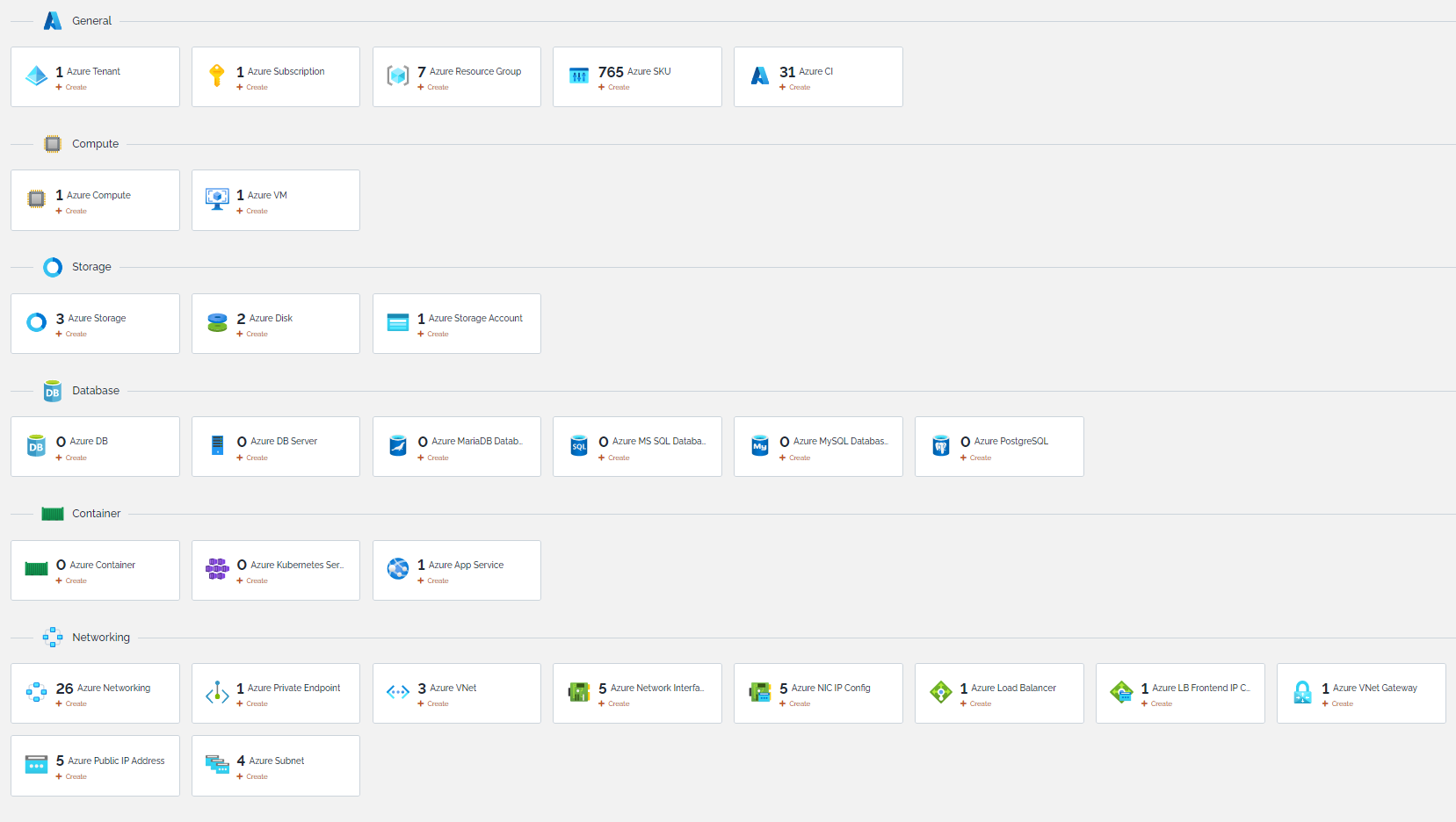
Revision
History
| Version |
Release Date |
Comments |
| 2.0.0 |
2023-05-16 |
* Group Azure objects in a submenu of the CMDB
dashboard
* Add 5 Azure classes related to IP addresses
* Introduce SKU typological elements
* Add attributes to different classes
* Improve relationships between classes
* Handle the optional presence of TeemIp |
| 1.0.0 |
2022-06-01 |
First version |
Limitations
Requirements
The extension can only be installed on iTop 2.7.0 and above,
including iTop 3, of course.
Installation
Use the Standard installation process for
this extension. Note that it alters the “Overview” dashboard of the
“Configuration Management” menu.
The extension is compatible
with both service options: “Service Management for Enterprises ”
and “Service Management for Providers”.
Configuration
The extension brings configuration parameters that enable a
direct access from an iTop Azure object to the detailed page of
that object within Microsoft Azure environment where more
information can be found.
- Configuration
-
'combodo-azure-datamodel' => array (
'direct_access' => array (
'label' => 'Azure',
'url' => 'https://portal.azure.com/#@$azuretenant$/$azureid$/overview',
'icon' => 'fas fa-cloud-upload-alt',
'tooltip' => 'Lookup directly in Azure',
),
),
| Parameter |
Meaning |
Default |
| label |
Name of the action displayed in the “Other
Actions” menu of objects |
Azure |
| url |
URL
to access Azure details page for the object, based on the customer
Tenant ID and the ID of the object within Azure |
https://portal.azure.com/#@$azuretenant$/$azureid$/overview |
| icon |
Font Awesome icon associated to the action
label |
fas fa-cloud-upload-alt, that appears as  |
| tooltip |
Tool tip associated to the action |
Lookup directly in Azure |
For the function to work
properly, you must first create the tenant that the object belongs
to. The collector will link the subscriptions to the tenant
identified by its ID in the collector's configuration file.
Usage
The link toward Microsoft described here above will appear in
the “Other Actions” menu, as show here in the detailed screen of a
Disk.
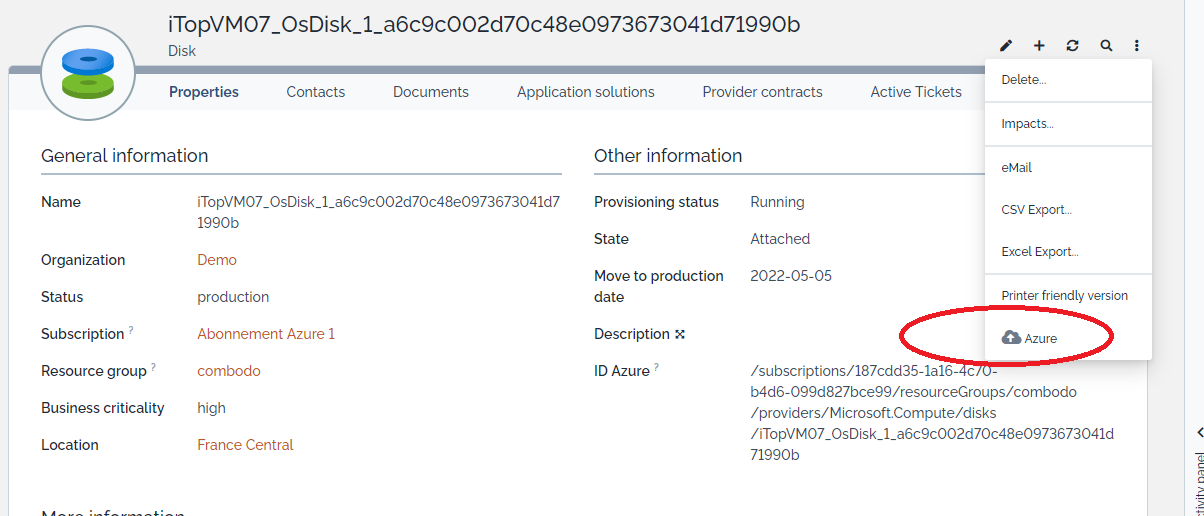
The Azure page will, of course, only open after appropriate
credentials are given. It may look as follows:
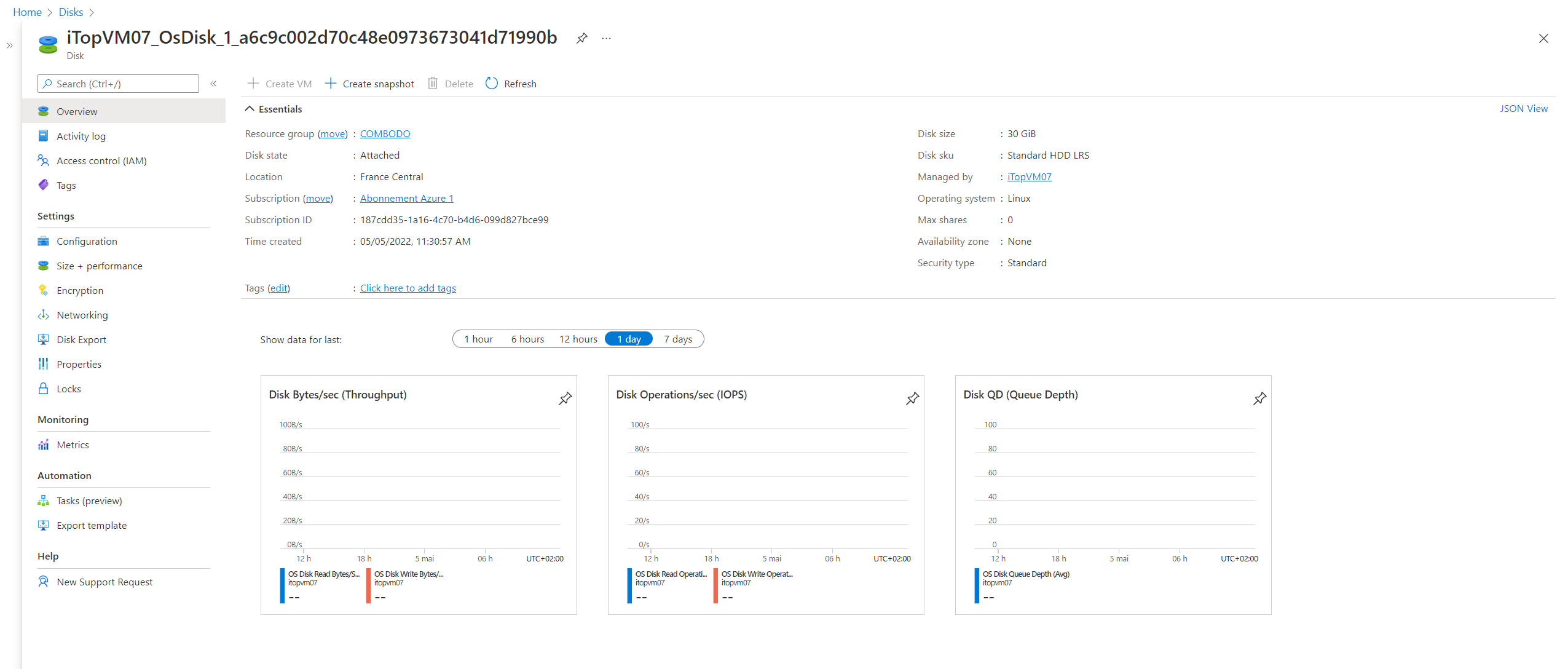
General objects
The following chapters list and describe all Azure objects
brought by the extension.
Description given here for the
different Azure objects and their attributes is very limited. For a
better and comprehensive description, please refer to the
Microsoft Azure documentation.
Location
 Locations defined in Azure
are mapped to standard iTop location objects. For that purpose, the
attribute “code” is added to the standard datamodel.
Locations defined in Azure
are mapped to standard iTop location objects. For that purpose, the
attribute “code” is added to the standard datamodel.
Location Properties
| Name |
Type |
Mandatory? |
Displaying a Location |
| Code |
Alphanumeric string |
Yes |
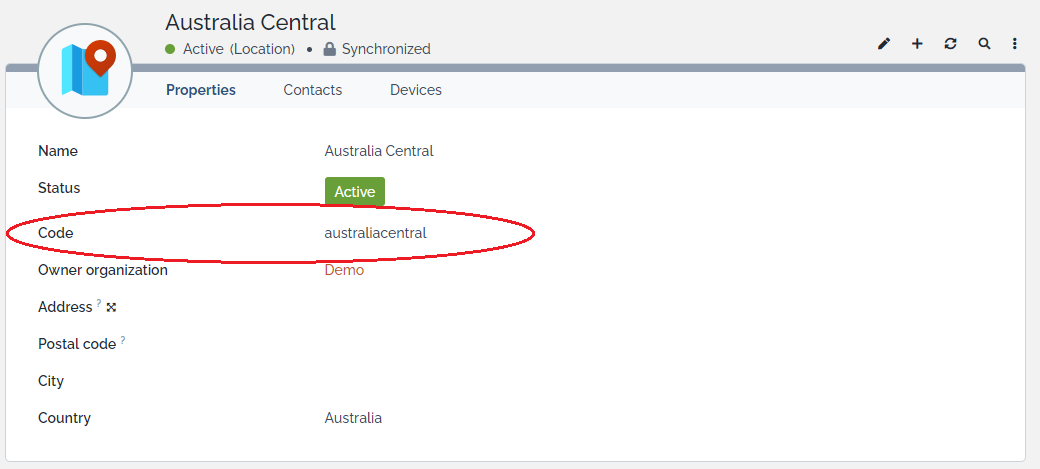 |
Tenant
 This class represents
the organizational objects that can be defined within Microsoft
Azure.
This class represents
the organizational objects that can be defined within Microsoft
Azure.
Tenant Properties
| Name |
Type |
Mandatory? |
Displaying an Azure Tenant |
| General
Information |
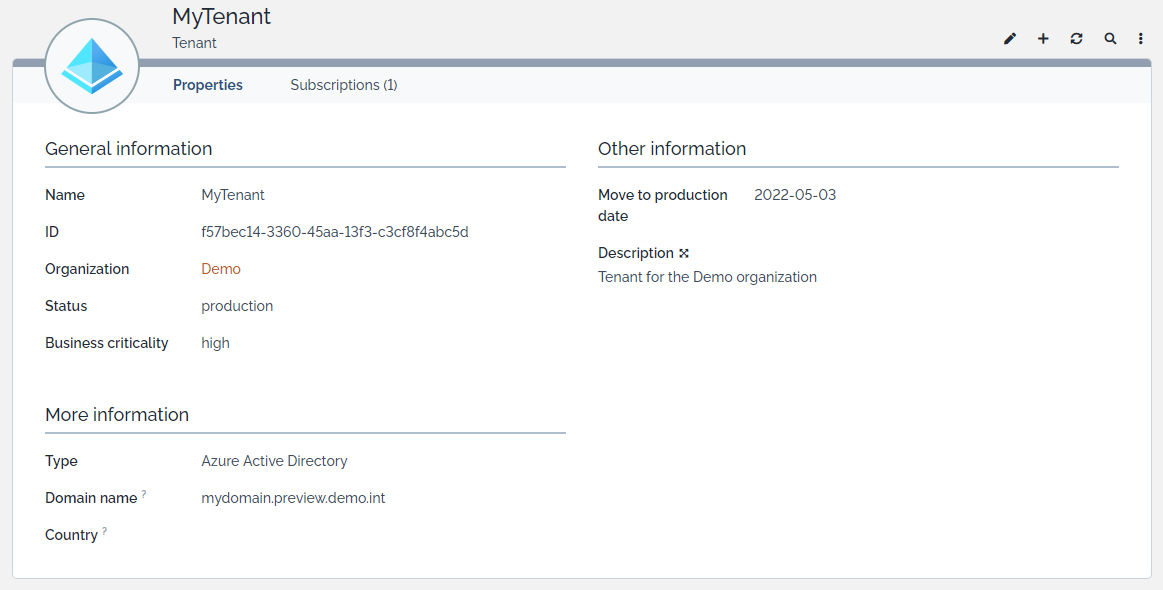 |
| Name |
Alphanumeric string |
Yes |
| ID |
Alphanumeric string |
No |
| Organization |
Foreign key to a(n) Organization |
No |
| Status |
Possible values: implementation, inactive,
obsolete, production, stock, stopped |
No |
| Business criticality |
Possible values: high, medium, low |
Yes |
| More Information |
| Type |
Possible values: Azure Active Directory, Azure
Active Directory (B2C) |
Yes |
| Domain name |
Alphanumeric string |
No |
| Country |
Alphanumeric string |
No |
| Other
Information |
| Move to production |
Date (year-month-day) |
No |
| Description |
HTML string |
No |
Tabs
| Tab |
Description |
| Subscriptions |
All the subscriptions that belong to the
Tenant |
Subscription
 Azure Subscriptions
are logical units of Azure services that are linked to an Azure
account. They've been defined in iTop as a daughter class of the
Contract class.
Azure Subscriptions
are logical units of Azure services that are linked to an Azure
account. They've been defined in iTop as a daughter class of the
Contract class.
Subscription Properties
| Name |
Type |
Mandatory? |
Displaying an Azure Subscription |
| General
Information |
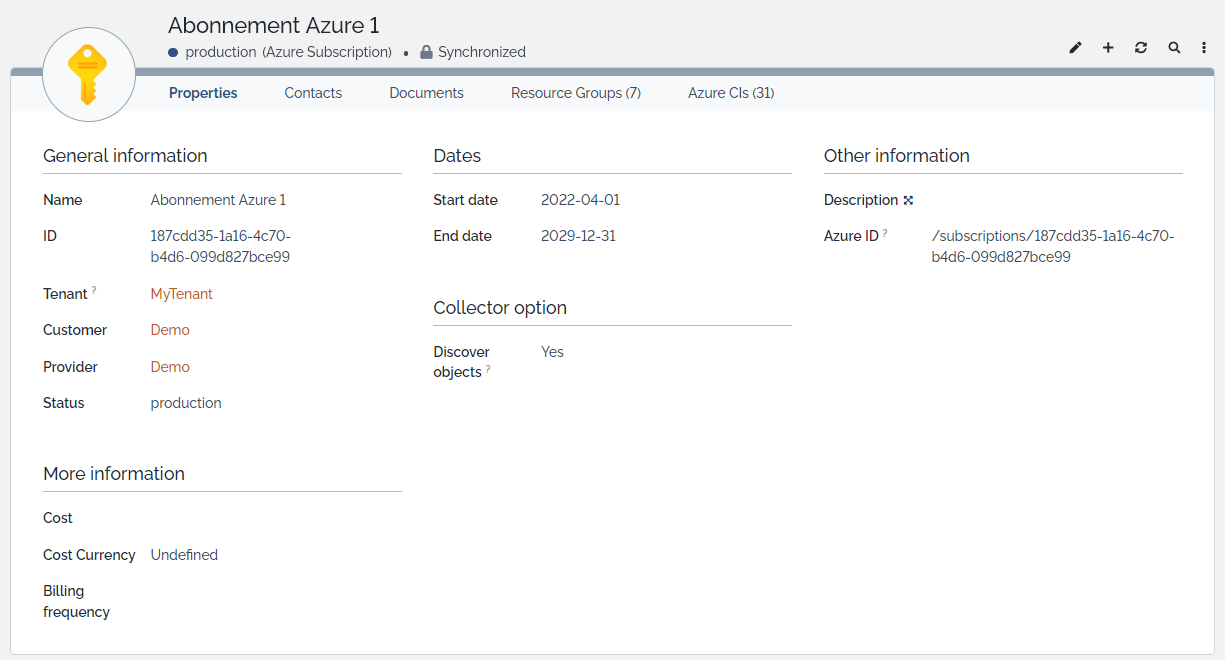 |
| Name |
Alphanumeric string |
Yes |
| ID |
Alphanumeric string |
No |
| Tenant |
Foreign key to a(n) Tenant |
No |
| Customer |
Foreign key to a(n) Organization |
No |
| Provider |
Foreign key to a(n) Organization |
No |
| Status |
Possible values: implementation, obsolete,
production |
No |
| More Information |
| Cost |
Alphanumeric string |
No |
| Cost Currency |
Possible values: Dollars, Euros |
No |
| Billing frequency |
Alphanumeric string |
No |
| Dates |
| Start date |
Date (year-month-day) |
No |
| End date |
Date (year-month-day) |
No |
| Collector option |
| Discover objects |
Possible values: Yes, No |
Yes |
| Other
Information |
| Azure ID |
Alphanumeric string |
No |
| Description |
HTML string |
No |
Tabs
| Tab |
Description |
| Contacts |
All the contacts linked to the subscription |
| Documents |
All the documentation related to the
subscription |
| Resource Groups |
All the resource groups that belong to that
subscription |
| Azure CIS |
All the CIs that are part of the subscription |
The “Discover objects” parameter enables the subscription to be
discovered through the Data
collector for Azure. When set to no, the collector will just
ignore all objects from that belong to the subscription.
When created by a collector,
the “Discover objects” is set, by default, to no. It needs,
therefore, to be changed to enable further collection.
Resource Group
 Azure Resource Groups
are nothing but logical containers where Azure resources can be
created and maintained.
Azure Resource Groups
are nothing but logical containers where Azure resources can be
created and maintained.
Azure Resource Group
Properties
| Name |
Type |
Mandatory? |
Displaying an Azure Resource
Group |
| General
Information |
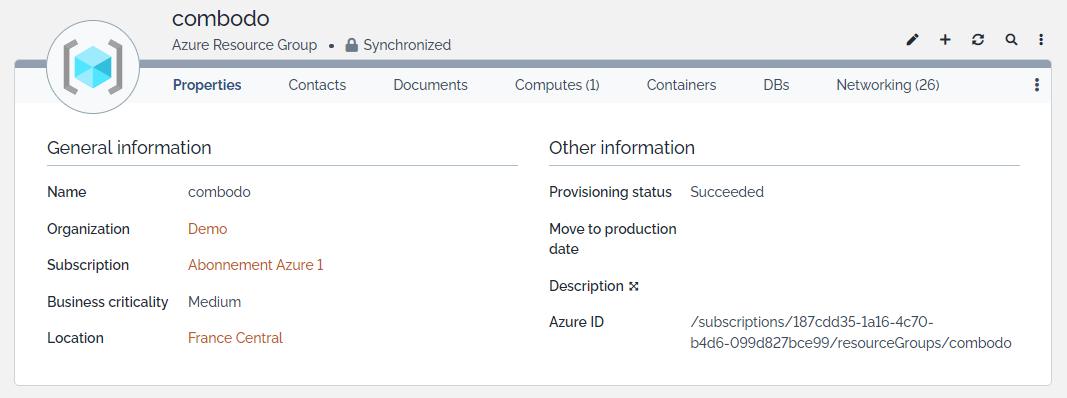 |
| Name |
Alphanumeric string |
Yes |
| Organization |
Foreign key to a(n) Organization |
Yes |
| Subscription |
Foreign key to a(n) Subscription |
Yes |
| Business criticality |
Possible values: high, medium, low |
No |
| Location |
Foreign key to a(n) Location |
No |
| Other
Information |
| Provisioning status |
Possible values: Cancelled, Deleting, Failed, in
progress, Succeeded |
Yes |
| Move to production date |
Date (year-month-day) |
No |
| Description |
HTML string |
No |
| Azure ID |
Alphanumeric string |
No |
Tabs
SKU
 Azure SKUs are typological
elements that some azure classes refer to.
Azure SKUs are typological
elements that some azure classes refer to.
Azure SKU Properties
| Name |
Type |
Mandatory? |
Displaying an Azure SKU |
| General
Information |
 |
| Name |
Alphanumeric string |
Yes |
| Type |
Alphanumeric string |
No |
| Family |
Alphanumeric string |
No |
| Tier |
Alphanumeric string |
No |
| Size |
Alphanumeric string |
No |
| Other
Information |
| Resource volume size (MB) |
Alphanumeric string |
No |
| OS VHD Disk
size (MB) |
Alphanumeric string |
No |
| vCPUs |
Alphanumeric string |
No |
| Memory (GB) |
Alphanumeric string |
No |
| vCPUs per core |
Alphanumeric string |
No |
| Network Interfaces |
Alphanumeric string |
No |
| Max size (GB) |
Alphanumeric string |
No |
| Max IO/s |
Alphanumeric string |
No |
| Max bandwidth (MB/s) |
Alphanumeric string |
No |
Tabs
| Tab |
Description |
| VMs |
All the VMs using that SKU |
| Disks |
All the disks using that SKU |
Compute objects
Azure VM
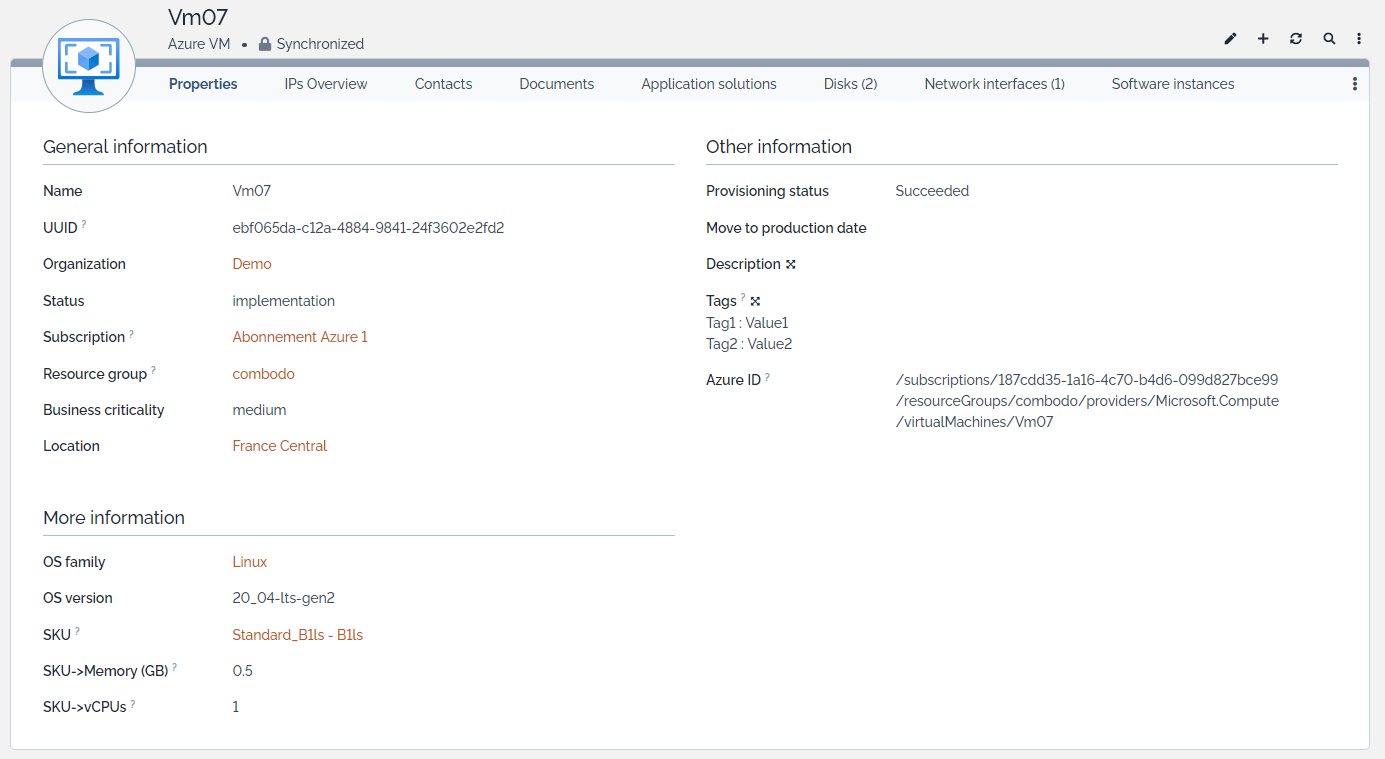 An Azure Virtual Machine
(VM) is one of several types of on-demand, scalable computing
resources that Azure offers.
An Azure Virtual Machine
(VM) is one of several types of on-demand, scalable computing
resources that Azure offers.
VM Properties
| Name |
Type |
Mandatory? |
Displaying an Azure VM |
| General
Information |
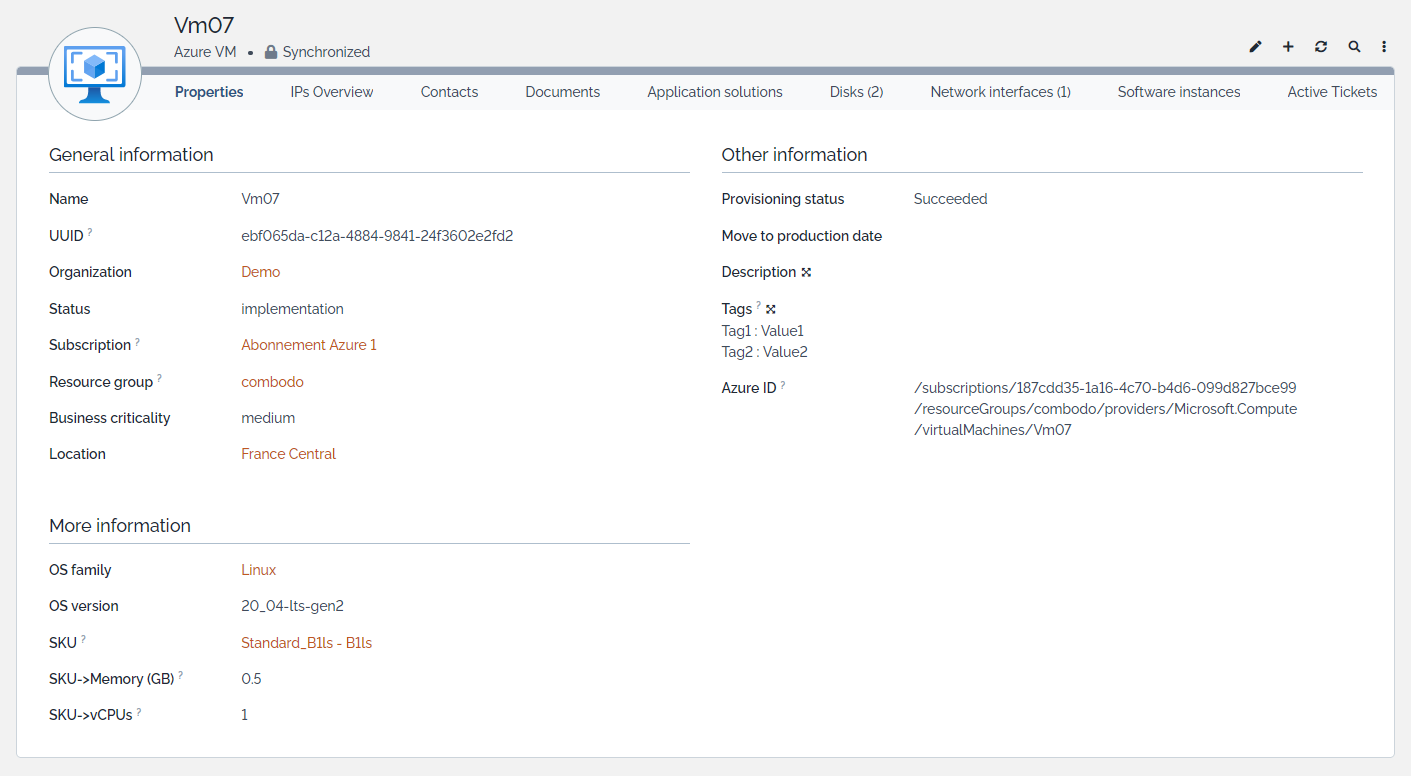 |
| Name |
Alphanumeric string |
Yes |
| UUID |
Alphanumeric string |
No |
| Organization |
Foreign key to a(n) Organization |
Yes |
| Status |
Possible values: implementation, inactive,
obsolete, production, stock, stopped |
No |
| Subscription |
Foreign key to a(n) Subscription |
No |
| Resource group |
Foreign key to a(n) Resource group |
No |
| Business criticality |
Possible values: high, medium, low |
No |
| Location |
Foreign key to a(n) Location |
No |
| More Information |
| OS
family |
Foreign key to a(n) OS Family |
No |
| OS
Version |
Alphanumeric string |
No |
| SKU |
Foreign key to a(n) SKU |
No |
| Memory (GB) |
Parameter of the SKU |
N/A |
| vCPUs |
Parameter of the SKU |
N/A |
| Other
Information |
| Provisioning status |
Possible values: Cancelled, Deleting, Failed, in
progress, Succeeded |
Yes |
| Move to production date |
Date (year-month-day) |
No |
| Description |
HTML string |
No |
| Tags |
Multiline character string |
No |
| Azure ID |
Alphanumeric string |
No |
Tabs
| Tab |
Description |
| IPs Overview |
Dashboard displaying the IPs related to the
VM |
| Contacts |
All the contacts linked to the VM |
| Documents |
All the documentation related to the VM |
| Application solutions |
Application solutions related to the VM |
| Disks |
List of the disks attached to the
VM |
| Network Interfaces |
All the Network Interfaces of the VM |
| Software instances |
All the software instances attached to the VM |
| Active Tickets |
Open tickets related to that CI |
Storage objects
Azure Disk
 Azure managed disks
are block-level storage volumes that are managed by Azure and used
with Azure Virtual Machines.
Azure managed disks
are block-level storage volumes that are managed by Azure and used
with Azure Virtual Machines.
Disk Properties
| Name |
Type |
Mandatory? |
Displaying an Azure Disk |
| General
Information |
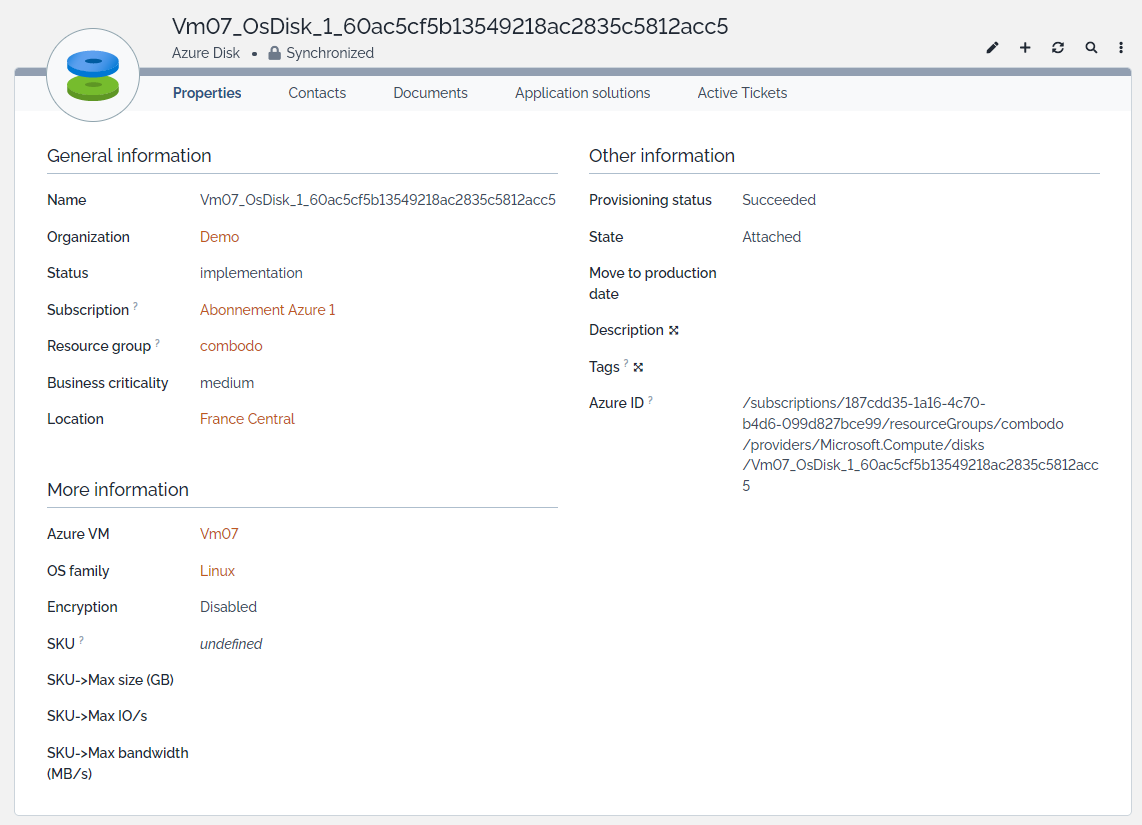 |
| Name |
Alphanumeric string |
Yes |
| Organization |
Foreign key to a(n) Organization |
Yes |
| Status |
Possible values: implementation, inactive,
obsolete, production, stock, stopped |
No |
| Subscription |
Foreign key to a(n) Subscription |
No |
| Resource group |
Foreign key to a(n) Resource group |
No |
| Business criticality |
Possible values: high, medium, low |
No |
| Location |
Foreign key to a(n) Location |
No |
| More Information |
| Azure VM |
Foreign key to a(n) VM |
No |
| OS
family |
Foreign key to a(n) OS family |
No |
| Encryption |
Possible values: Enabled, Disabled |
No |
| SKU |
Foreign key to a(n) SKU |
No |
| Max size (GB) |
Parameter of the SKU |
N/A |
| Max IO/s |
Parameter of the SKU |
N/A |
| Max bandwidth (MB/s) |
Parameter of the SKU |
N/A |
| Other
Information |
| Provisioning status |
Possible values: Cancelled, Deleting, Failed, in
progress, Succeeded |
Yes |
| State |
Possible values: Active SAS, Active upload,
Attached, Ready to upload, Reserved, Unattached |
Yes |
| Move to production date |
Date (year-month-day) |
No |
| Description |
HTML string |
No |
| Tags |
Multiline character string |
No |
| Azure ID |
Alphanumeric string |
No |
Tabs
| Tab |
Description |
| Contacts |
All the contacts linked to the disk |
| Documents |
All the documentation related to the disk |
| Application solutions |
Application solutions related to the disk |
| Active Tickets |
Open tickets related to that CI |
Storage Account
 An Azure storage
account provides a unique namespace for your Azure Storage data. It
contains all of your Azure Storage data objects, including blobs,
file shares, queues, tables, and disks.
An Azure storage
account provides a unique namespace for your Azure Storage data. It
contains all of your Azure Storage data objects, including blobs,
file shares, queues, tables, and disks.
Storage Account Properties
| Name |
Type |
Mandatory? |
Displaying an Azure Storage
Account |
| General
Information |
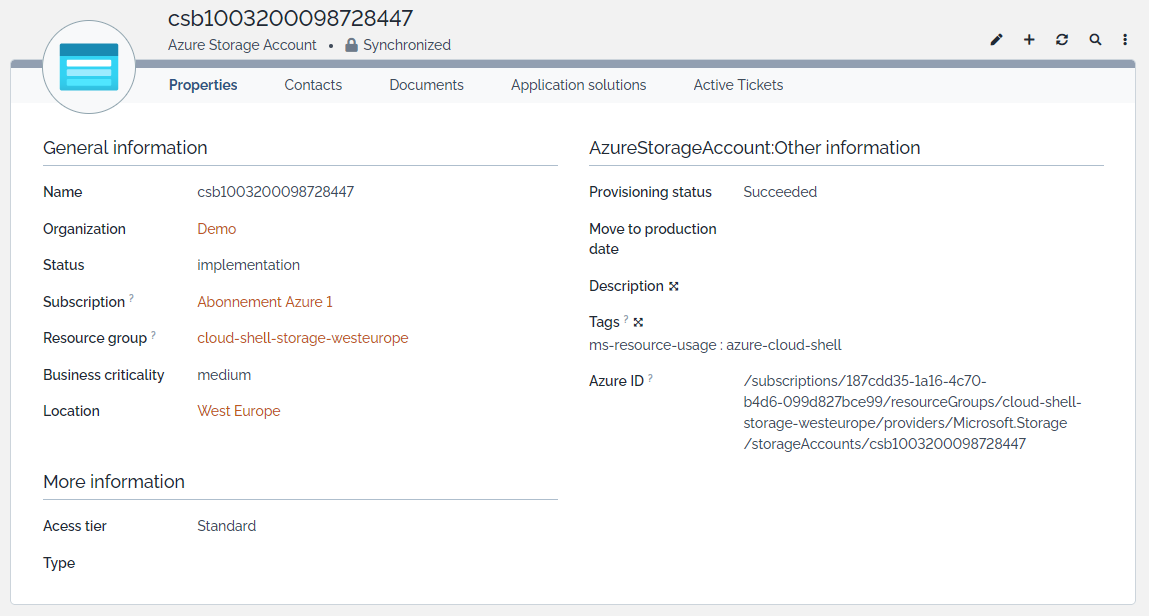 |
| Name |
Alphanumeric string |
Yes |
| Organization |
Foreign key to a(n) Organization |
Yes |
| Status |
Possible values: implementation, inactive,
obsolete, production, stock, stopped |
No |
| Subscription |
Foreign key to a(n) Subscription |
No |
| Resource group |
Foreign key to a(n) Resource group |
No |
| Business criticality |
Possible values: high, medium, low |
No |
| Location |
Foreign key to a(n) Location |
No |
| More Information |
| Access tier |
Alphanumeric string |
No |
| Type |
Possible values: Blob, DFS, File, Queue, table,
WEB |
No |
| Other
Information |
| Provisioning status |
Possible values: Cancelled, Deleting, Failed, in
progress, Succeeded |
Yes |
| Move to production date |
Date (year-month-day) |
No |
| Description |
HTML string |
No |
| Tags |
Multiline character string |
No |
| Azure ID |
Alphanumeric string |
No |
Tabs
| Tab |
Description |
| Contacts |
All the contacts linked to the storage
account |
| Documents |
All the documentation related to the storage
account |
| Application solutions |
Application solutions related to the storage
account |
| Active Tickets |
Open tickets related to that CI |
Database
objects
Azure DB Server

In Azure, a database server is a logical construct that acts as
a central administrative point for a collection of databases.
DB Server Properties
| Name |
Type |
Mandatory? |
Displaying an Azure DB Server |
| General
Information |
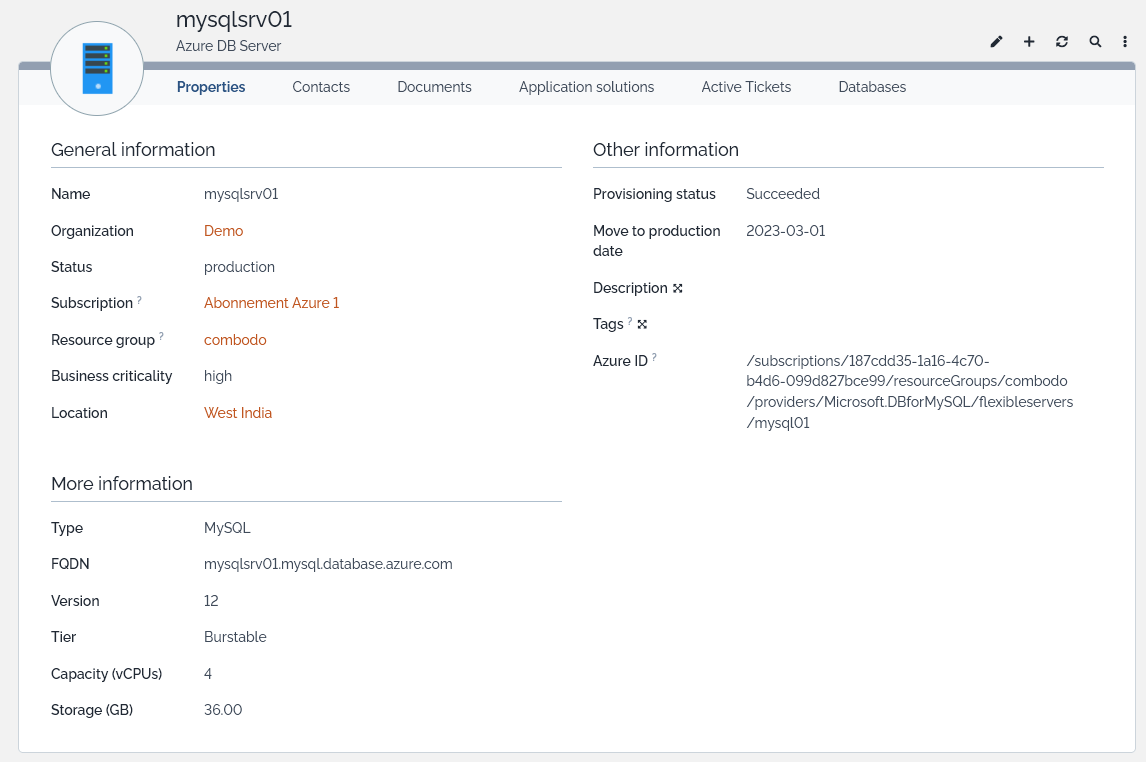 |
| Name |
Alphanumeric string |
Yes |
| Organization |
Foreign key to a(n) Organization |
Yes |
| Status |
Possible values: implementation, inactive,
obsolete, production, stock, stopped |
No |
| Subscription |
Foreign key to a(n) Subscription |
No |
| Resource group |
Foreign key to a(n) Resource group |
No |
| Business criticality |
Possible values: high, medium, low |
No |
| Location |
Foreign key to a(n) Location |
No |
| More Information |
| Type |
Possible values: MariaDB, SQL, MySQL,
PostgreSQL |
No |
| FQDN |
Alphanumeric string |
No |
| Version |
Alphanumeric string |
No |
| Tier |
Alphanumeric string |
No |
| Capacity (vCPUs) |
Alphanumeric string |
No |
| Storage (GB) |
Integer |
No |
| Other
Information |
| Provisioning status |
Possible values: Cancelled, Deleting, Failed, in
progress, Succeeded |
Yes |
| Move to production date |
Date (year-month-day) |
No |
| Description |
HTML string |
No |
| Tags |
Multiline character string |
No |
| Azure ID |
Alphanumeric string |
No |
Tabs
| Tab |
Description |
| Contacts |
All the contacts linked to the database |
| Documents |
All the documentation related to the database |
| Application solutions |
Application solutions related to the database |
| Active Tickets |
Open tickets related to that CI |
| Databases |
All the data bases hosted by the server |
MariaDB
Database

Azure Database for MariaDB is a relational database service in
the Microsoft cloud. It is based on the MariaDB community edition
(available under the GPLv2 license) database engine.
MariaDB Database
Properties
| Name |
Type |
Mandatory? |
Displaying an Azure MariaDB
Database |
| General
Information |
 |
| Name |
Alphanumeric string |
Yes |
| Organization |
Foreign key to a(n) Organization |
Yes |
| Status |
Possible values: implementation, inactive,
obsolete, production, stock, stopped |
No |
| Subscription |
Foreign key to a(n) Subscription |
No |
| Resource group |
Foreign key to a(n) Resource group |
No |
| Business criticality |
Possible values: high, medium, low |
No |
| Location |
Foreign key to a(n) Location |
No |
| More Information |
| DB Server |
Foreign key to a(n) DB Server |
No |
| DB Server name |
Parameter of the DB Server |
N/A |
| Version |
Parameter of the DB Server |
N/A |
| Tier |
Parameter of the DB Server |
N/A |
| Capacity (vCPUs) |
Parameter of the DB Server |
N/A |
| Storage (GB) |
Parameter of the DB Server |
N/A |
| Other
Information |
| Move to production date |
Date (year-month-day) |
No |
| Description |
HTML string |
No |
| Tags |
Multiline character string |
No |
| Azure ID |
Alphanumeric string |
No |
Tabs
| Tab |
Description |
| Contacts |
All the contacts linked to the database |
| Documents |
All the documentation related to the database |
| Application solutions |
Application solutions related to the database |
| Active Tickets |
Open tickets related to that CI |
MySQL Database

Azure Database for MySQL is a relational database service in the
Microsoft cloud based on the MySQL Community Edition (available
under the GPLv2 license) database engine
MySQL Database Properties
| Name |
Type |
Mandatory? |
Displaying an Azure MySQL
Database |
| General
Information |
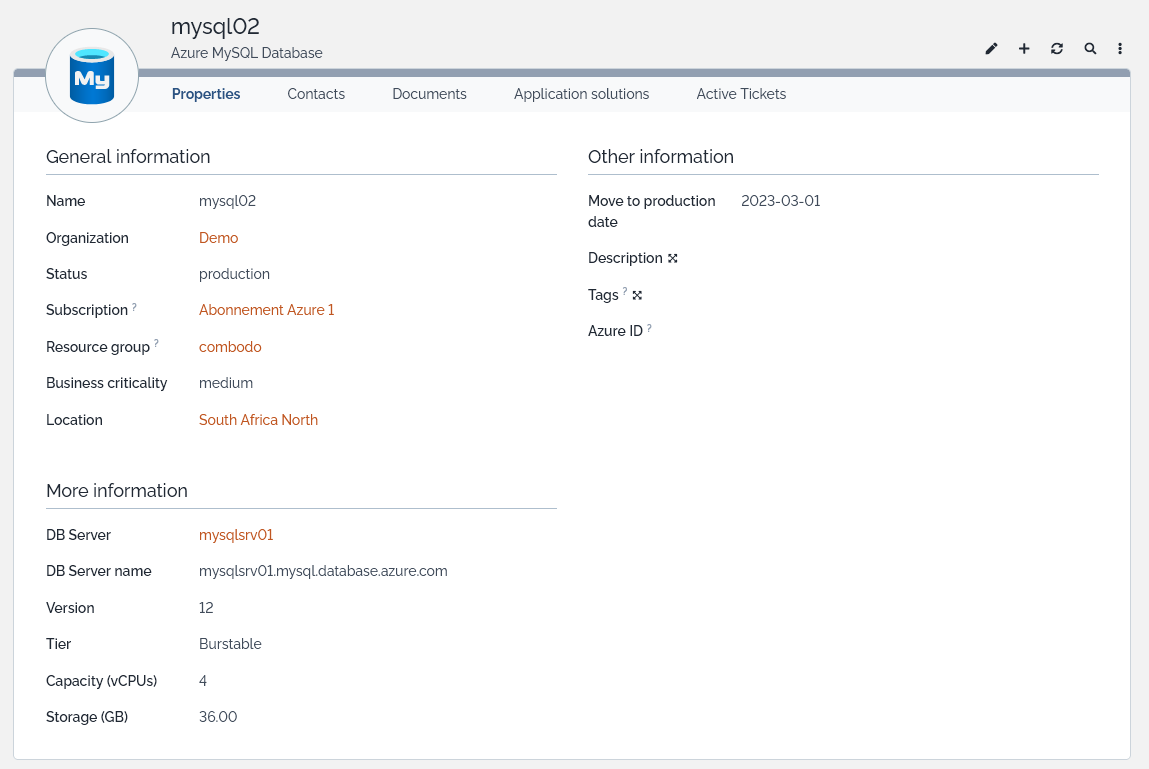 |
| Name |
Alphanumeric string |
Yes |
| Organization |
Foreign key to a(n) Organization |
Yes |
| Status |
Possible values: implementation, inactive,
obsolete, production, stock, stopped |
No |
| Subscription |
Foreign key to a(n) Subscription |
No |
| Resource group |
Foreign key to a(n) Resource group |
No |
| Business criticality |
Possible values: high, medium, low |
No |
| Location |
Foreign key to a(n) Location |
No |
| More Information |
| DB Server |
Foreign key to a(n) DB Server |
No |
| DB Server name |
Parameter of the DB Server |
N/A |
| Version |
Parameter of the DB Server |
N/A |
| Tier |
Parameter of the DB Server |
N/A |
| Capacity (vCPUs) |
Parameter of the DB Server |
N/A |
| Storage (GB) |
Parameter of the DB Server |
N/A |
| Other
Information |
| Move to production date |
Date (year-month-day) |
No |
| Description |
HTML string |
No |
| Tags |
Multiline character string |
No |
| Azure ID |
Alphanumeric string |
No |
Tabs
| Tab |
Description |
| Contacts |
All the contacts linked to the database |
| Documents |
All the documentation related to the database |
| Application solutions |
Application solutions related to the database |
| Active Tickets |
Open tickets related to that CI |
MS SQL Database
MS SQL Database Properties
| Name |
Type |
Mandatory? |
Displaying an Azure MS SQL
Database |
| General
Information |
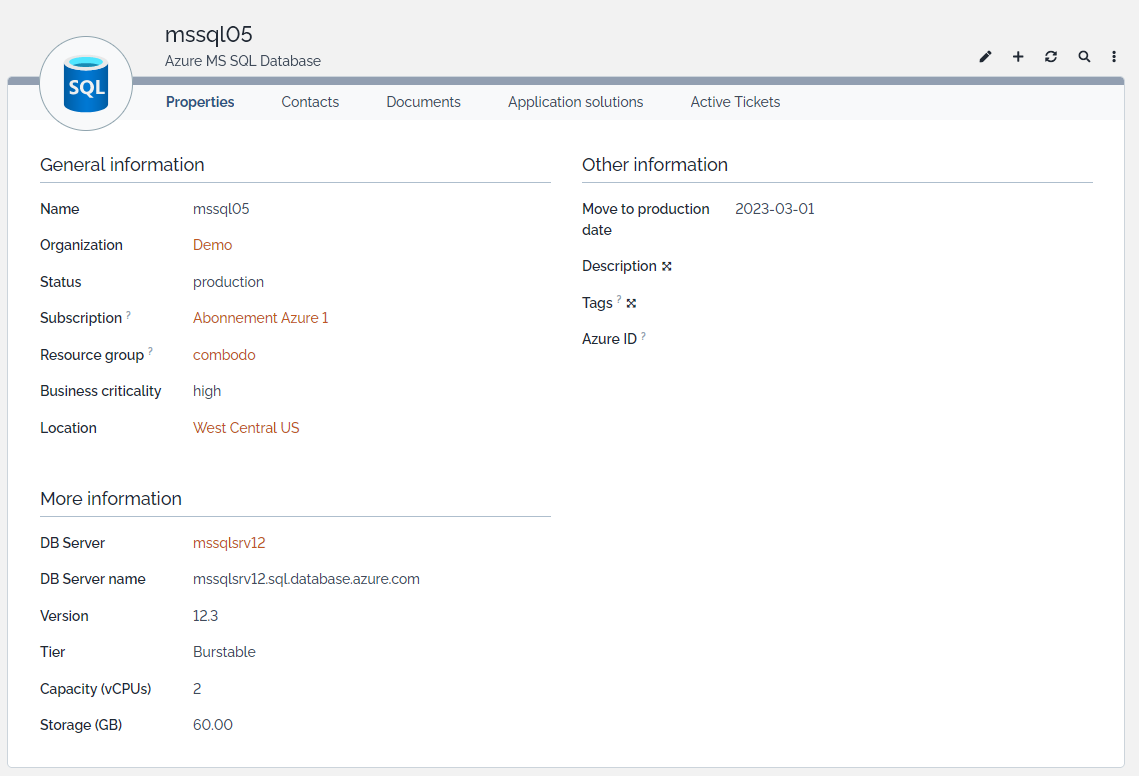 |
| Name |
Alphanumeric string |
Yes |
| Organization |
Foreign key to a(n) Organization |
Yes |
| Status |
Possible values: implementation, inactive,
obsolete, production, stock, stopped |
No |
| Subscription |
Foreign key to a(n) Subscription |
No |
| Resource group |
Foreign key to a(n) Resource group |
No |
| Business criticality |
Possible values: high, medium, low |
No |
| Location |
Foreign key to a(n) Location |
No |
| More Information |
| DB Server |
Foreign key to a(n) DB Server |
No |
| DB Server name |
Parameter of the DB Server |
N/A |
| Version |
Parameter of the DB Server |
N/A |
| Tier |
Parameter of the DB Server |
N/A |
| Capacity (vCPUs) |
Parameter of the DB Server |
N/A |
| Storage (GB) |
Parameter of the DB Server |
N/A |
| Other
Information |
| Move to production date |
Date (year-month-day) |
No |
| Description |
HTML string |
No |
| Tags |
Multiline character string |
No |
| Azure ID |
Alphanumeric string |
No |
Tabs
| Tab |
Description |
| Contacts |
All the contacts linked to the database |
| Documents |
All the documentation related to the database |
| Application solutions |
Application solutions related to the database |
| Active Tickets |
Open tickets related to that CI |
PostgreSQL

Azure Database for PostgreSQL is a relational database service
in the Microsoft cloud based on the PostgreSQL open source
relational database.
PostgreSQL Properties
| Name |
Type |
Mandatory? |
Displaying an Azure PostgreSQL |
| General
Information |
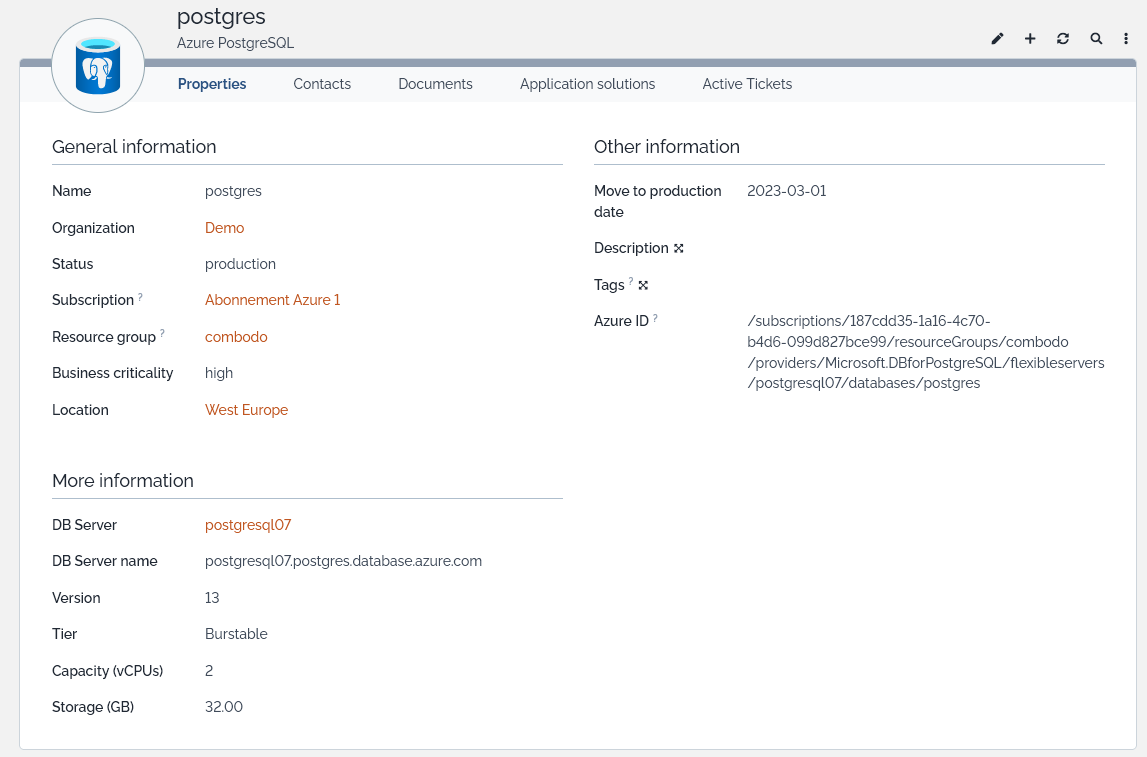 |
| Name |
Alphanumeric string |
Yes |
| Organization |
Foreign key to a(n) Organization |
Yes |
| Status |
Possible values: implementation, inactive,
obsolete, production, stock, stopped |
No |
| Subscription |
Foreign key to a(n) Subscription |
No |
| Resource group |
Foreign key to a(n) Resource group |
No |
| Business criticality |
Possible values: high, medium, low |
No |
| Location |
Foreign key to a(n) Location |
No |
| More Information |
| DB Server |
Foreign key to a(n) DB Server |
No |
| DB Server name |
Parameter of the DB Server |
N/A |
| Version |
Parameter of the DB Server |
N/A |
| Tier |
Parameter of the DB Server |
N/A |
| Capacity (vCPUs) |
Parameter of the DB Server |
N/A |
| Storage (GB) |
Parameter of the DB Server |
N/A |
| Other
Information |
| Move to production date |
Date (year-month-day) |
No |
| Description |
HTML string |
No |
| Tags |
Multiline character string |
No |
| Azure ID |
Alphanumeric string |
No |
Tabs
| Tab |
Description |
| Contacts |
All the contacts linked to the database |
| Documents |
All the documentation related to the database |
| Application solutions |
Application solutions related to the database |
| Active Tickets |
Open tickets related to that CI |
Container
objects
Kubernetes
Service
 Azure Kubernetes
Service is a managed container orchestration service based on the
open source Kubernetes system, which is available on the Microsoft
Azure public cloud.
Azure Kubernetes
Service is a managed container orchestration service based on the
open source Kubernetes system, which is available on the Microsoft
Azure public cloud.
Kubernetes Service
Properties
| Name |
Type |
Mandatory? |
Displaying an Azure Kubernetes
Service |
| General
Information |
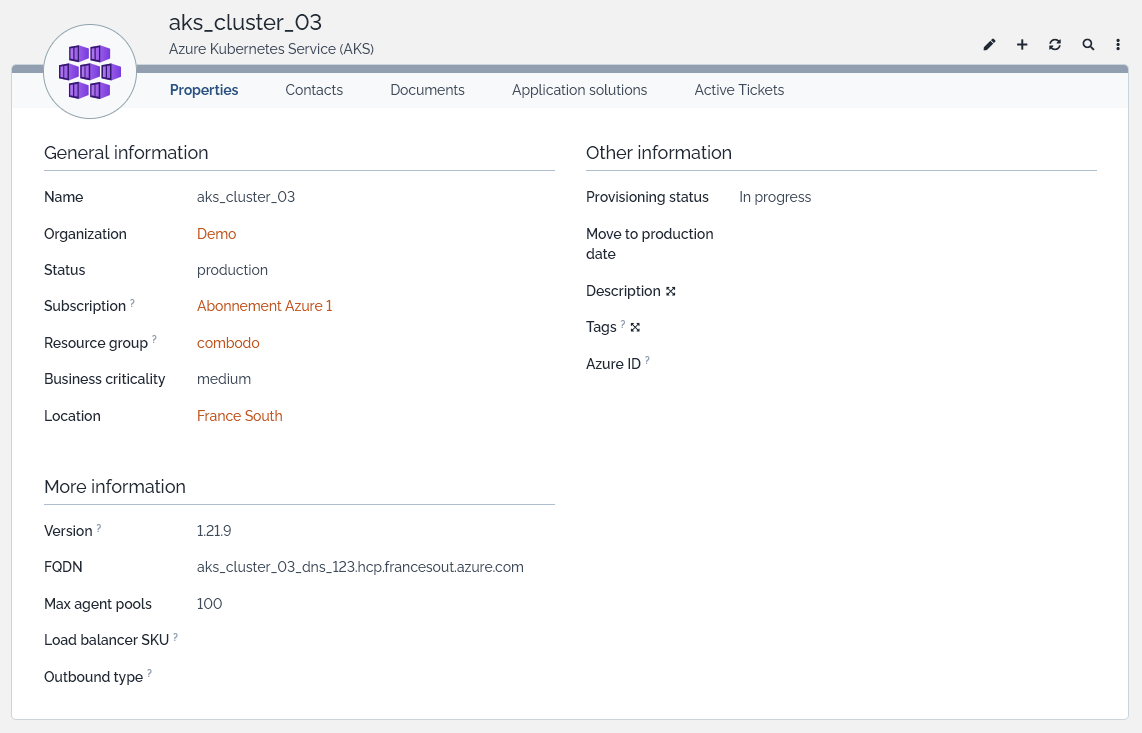 |
| Name |
Alphanumeric string |
Yes |
| Organization |
Foreign key to a(n) Organization |
Yes |
| Status |
Possible values: implementation, inactive,
obsolete, production, stock, stopped |
No |
| Subscription |
Foreign key to a(n) Subscription |
No |
| Resource group |
Foreign key to a(n) Resource group |
No |
| Business criticality |
Possible values: high, medium, low |
No |
| Location |
Foreign key to a(n) Location |
No |
| More Information |
| Version |
Alphanumeric string |
No |
| FQDN |
Alphanumeric string |
No |
| Max agent pools |
Integer |
No |
| Load balancer SKU |
Alphanumeric string |
No |
| Outbound type |
Alphanumeric string |
No |
| Other
Information |
| Provisioning status |
Possible values: Cancelled, Deleting, Failed, in
progress, Succeeded |
Yes |
| Move to production date |
Date (year-month-day) |
No |
| Description |
HTML string |
No |
| Tags |
Multiline character string |
No |
| Azure ID |
Alphanumeric string |
No |
Tabs
| Tab |
Description |
| Contacts |
All the contacts linked to the Kubernetes
service |
| Documents |
All the documentation related to the Kubernetes
service |
| Application solutions |
Application solutions related to the Kubernetes
service |
| Active Tickets |
Open tickets related to that CI |
App Service
 An Azure App Service
is an HTTP-based service for hosting web applications, REST APIs,
and mobile back ends.
An Azure App Service
is an HTTP-based service for hosting web applications, REST APIs,
and mobile back ends.
App Service Properties
| Name |
Type |
Mandatory? |
Displaying an Azure App Service |
| General
Information |
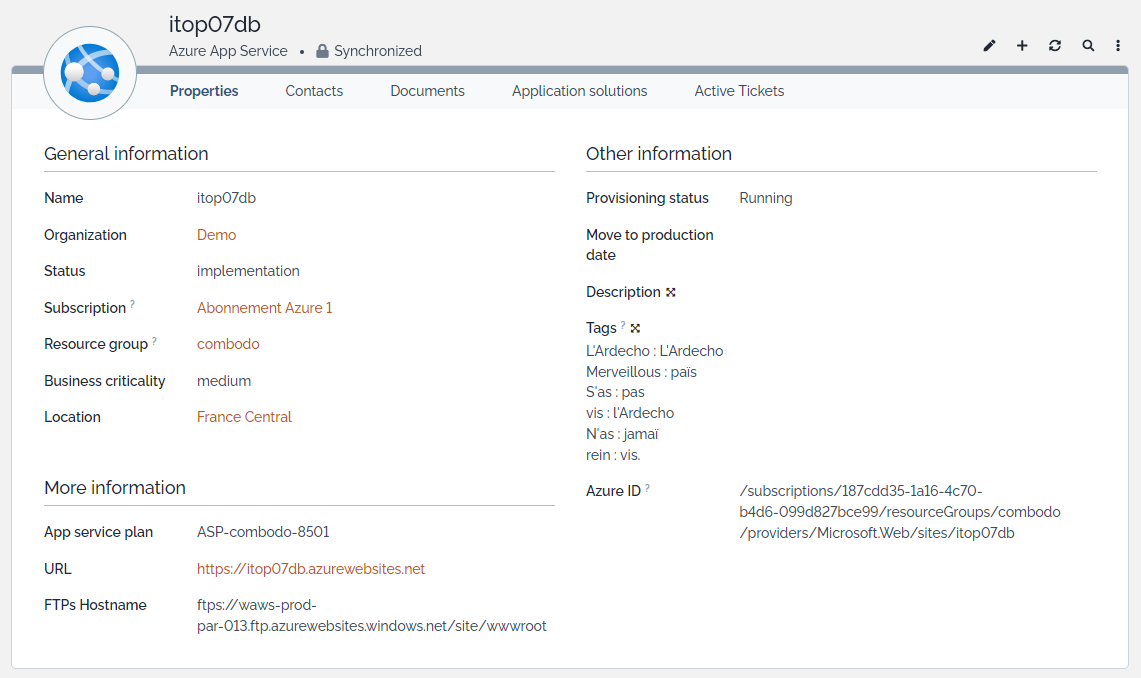 |
| Name |
Alphanumeric string |
Yes |
| Organization |
Foreign key to a(n) Organization |
Yes |
| Status |
Possible values: implementation, inactive,
obsolete, production, stock, stopped |
No |
| Subscription |
Foreign key to a(n) Subscription |
No |
| Resource group |
Foreign key to a(n) Resource group |
No |
| Business criticality |
Possible values: high, medium, low |
No |
| Location |
Foreign key to a(n) Location |
No |
| More Information |
| App service plan |
Alphanumeric string |
No |
| URL |
Alphanumeric string |
No |
| FTPs Hostname |
Alphanumeric string |
No |
| Other
Information |
| Provisioning status |
Possible values: Cancelled, Deleting, Failed, in
progress, Succeeded |
Yes |
| Move to production date |
Date (year-month-day) |
No |
| Description |
HTML string |
No |
| Tags |
Multiline character string |
No |
| Azure ID |
Alphanumeric string |
No |
Tabs
| Tab |
Description |
| Contacts |
All the contacts linked to the subscription |
| Documents |
All the documentation related to the
subscription |
| Application solutions |
Application solutions related to the App |
| Active Tickets |
Open tickets related to that CI |
Networking
objects
Private
Endpoint
 A private endpoint is
a network interface that uses a private IP address from your
virtual network. This network interface connects you privately and
securely to a service that's powered by Azure Private Link. By
enabling a private endpoint, you're bringing the service into your
virtual network.
A private endpoint is
a network interface that uses a private IP address from your
virtual network. This network interface connects you privately and
securely to a service that's powered by Azure Private Link. By
enabling a private endpoint, you're bringing the service into your
virtual network.
Private Endpoint
Properties
| Name |
Type |
Mandatory? |
Displaying an Azure Private
Endpoint |
| General
Information |
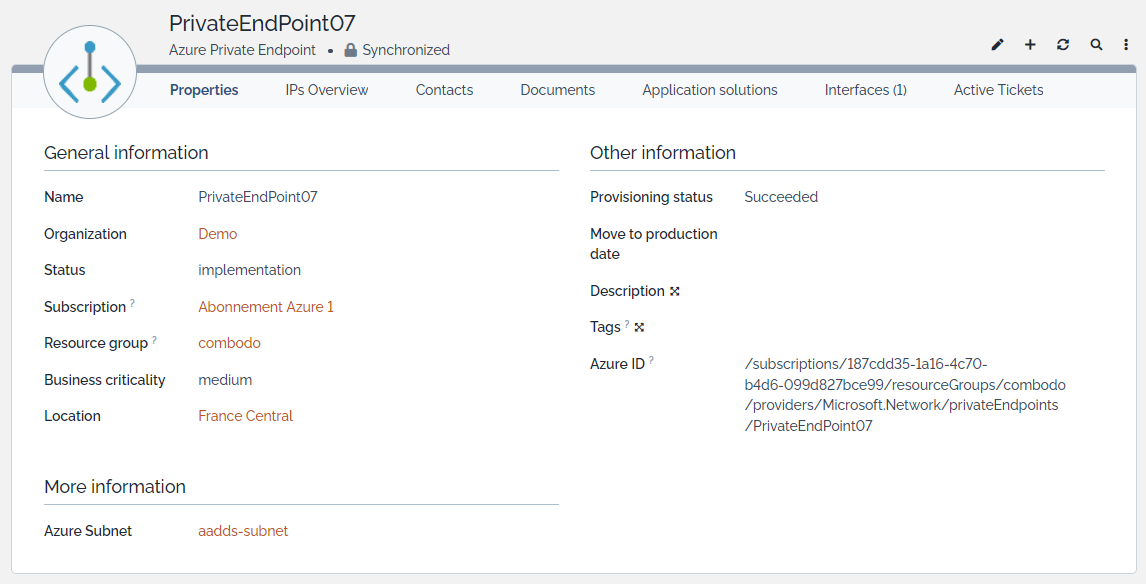 |
| Name |
Alphanumeric string |
Yes |
| Organization |
Foreign key to a(n) Organization |
Yes |
| Status |
Possible values: implementation, inactive,
obsolete, production, stock, stopped |
No |
| Subscription |
Foreign key to a(n) Subscription |
No |
| Resource group |
Foreign key to a(n) Resource group |
No |
| Business criticality |
Possible values: high, medium, low |
No |
| Location |
Foreign key to a(n) Location |
No |
| More Information |
| Azure Subnet |
Foreign key to a(n) Subnet |
No |
| Other
Information |
| Provisioning status |
Possible values: Cancelled, Deleting, Failed, in
progress, Succeeded |
Yes |
| Move to production date |
Date (year-month-day) |
No |
| Description |
HTML string |
No |
| Tags |
Multiline character string |
No |
| Azure ID |
Alphanumeric string |
No |
Tabs
| Tab |
Description |
| IPs Overview* |
Dashboard displaying the IPs related to the
private endpoint |
| Contacts |
All the contacts linked to the private
endpoint |
| Documents |
All the documentation related to the private
endpoint |
| Application solutions |
Application solutions related to the private
endpoint |
| Interfaces |
Interfaces attached to the private endpoint |
| Active Tickets |
Open tickets related to that CI |
IPs Overview tab is only available
when TeemIp (aka IPAM for iTop) is installed.
VNet
 Azure Virtual Network
(VNet) is the fundamental building block for your private network
in Azure. It enables many types of Azure resources, such as Azure
VMs, to securely communicate with each other, the internet, and
on-premises networks.
Azure Virtual Network
(VNet) is the fundamental building block for your private network
in Azure. It enables many types of Azure resources, such as Azure
VMs, to securely communicate with each other, the internet, and
on-premises networks.
VNet Properties
| Name |
Type |
Mandatory? |
Displaying an Azure VNet |
| General
Information |
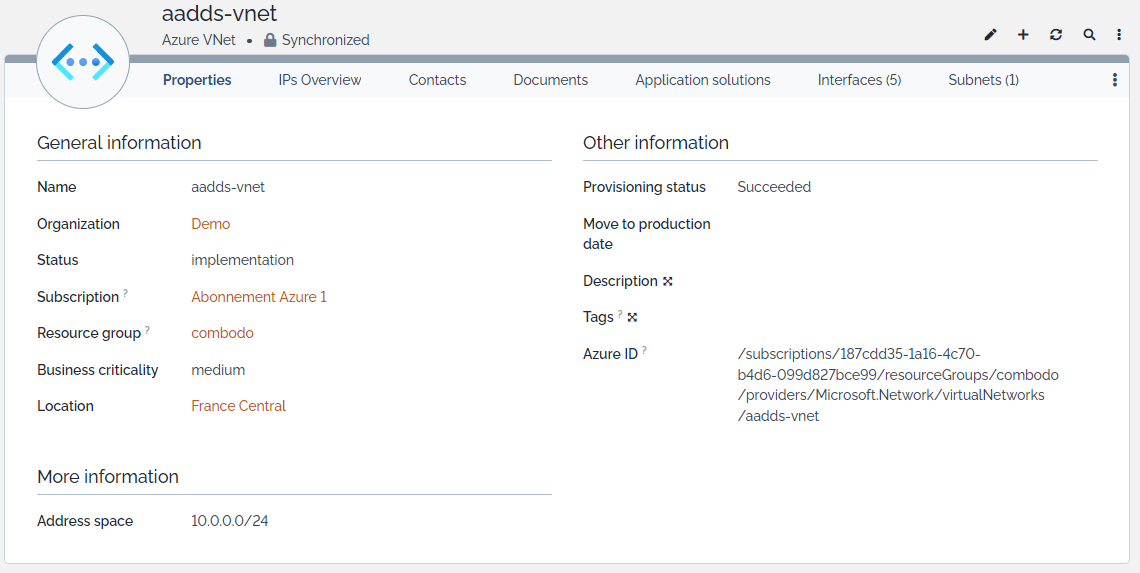 |
| Name |
Alphanumeric string |
Yes |
| Organization |
Foreign key to a(n) Organization |
Yes |
| Status |
Possible values: implementation, inactive,
obsolete, production, stock, stopped |
No |
| Subscription |
Foreign key to a(n) Subscription |
No |
| Resource group |
Foreign key to a(n) Resource group |
No |
| Business criticality |
Possible values: high, medium, low |
No |
| Location |
Foreign key to a(n) Location |
No |
| More Information |
| Address space |
Alphanumeric string |
No |
| Other
Information |
| Provisioning status |
Possible values: Cancelled, Deleting, Failed, in
progress, Succeeded |
Yes |
| Move to production date |
Date (year-month-day) |
No |
| Description |
HTML string |
No |
| Tags |
Multiline character string |
No |
| Azure ID |
Alphanumeric string |
No |
Tabs
| Tab |
Description |
| IPs Overview* |
Dashboard displaying the IPs related to the
Vnet |
| Contacts |
All the contacts linked to the Vnet |
| Documents |
All the documentation related to the Vnet |
| Application solutions |
Application solutions related to the Vnet |
| Interfaces |
All the Network Interfaces of the Vnet |
| Subnets |
All subnets of the Vnet |
| Active Tickets |
Open tickets related to that CI |
IPs Overview tab is only available
when TeemIp (aka IPAM for iTop) is installed.
Network
Interface
 A Network Interface
Card (NIC) is an interconnection between a Virtual Machine and the
underlying software network.
A Network Interface
Card (NIC) is an interconnection between a Virtual Machine and the
underlying software network.
Network Interface
Properties
| Name |
Type |
Mandatory? |
Displaying an Azure Network
Interface |
| General
Information |
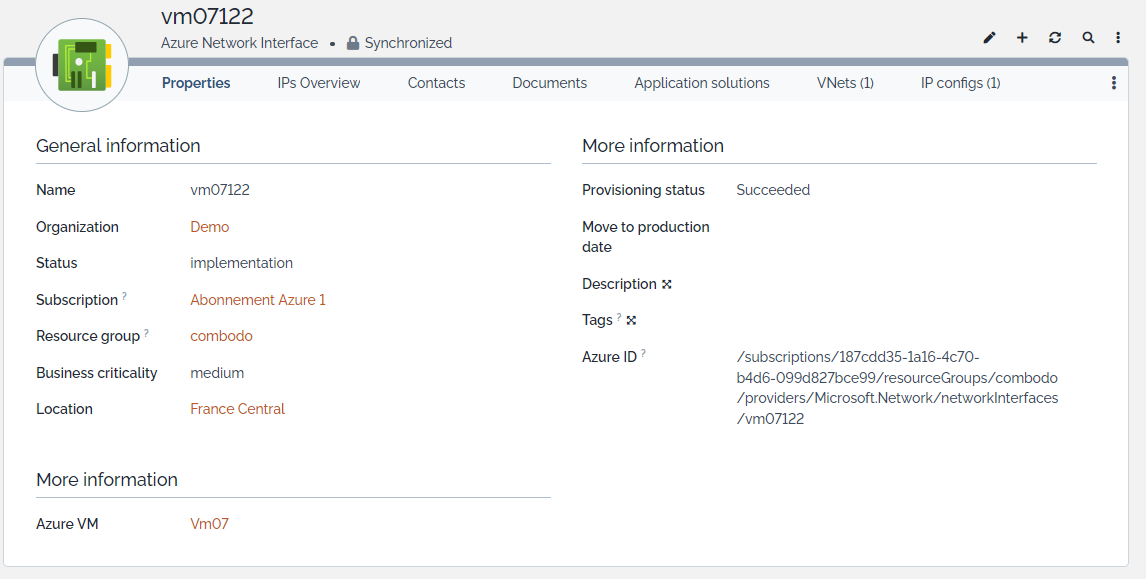 |
| Name |
Alphanumeric string |
Yes |
| Organization |
Foreign key to a(n) Organization |
Yes |
| Status |
Possible values: implementation, inactive,
obsolete, production, stock, stopped |
No |
| Subscription |
Foreign key to a(n) Subscription |
No |
| Resource group |
Foreign key to a(n) Resource group |
No |
| Business criticality |
Possible values: high, medium, low |
No |
| Location |
Foreign key to a(n) Location |
No |
| More Information |
| Azure VM |
Foreign key to a(n) VM |
No |
| Other
Information |
| Provisioning status |
Possible values: Cancelled, Deleting, Failed, in
progress, Succeeded |
Yes |
| Move to production date |
Date (year-month-day) |
No |
| Description |
HTML string |
No |
| Tags |
Multiline character string |
No |
| Azure ID |
Alphanumeric string |
No |
Tabs
| Tab |
Description |
| IPs Overview* |
Dashboard displaying the IPs related to the
network interface |
| Contacts |
All the contacts linked to the network
interface |
| Documents |
All the documentation related to the network
interface |
| Application solutions |
Application solutions related to the network
interface |
| VNets |
Virtual Networks attached to the network
interface |
| IP configs |
NIC IP configs attached to the network
interface |
| Private Endpoints |
Private Endpoints related to the network
interface |
| Active Tickets |
Open tickets related to that CI |
IPs Overview tab is only available
when TeemIp (aka IPAM for iTop) is installed.
Network Interface Card IP Config
 Network Interface Card
IP Config host the IP configuration that can be assigned to a
virtual machine's network interface card.
Network Interface Card
IP Config host the IP configuration that can be assigned to a
virtual machine's network interface card.
Network
Interface Card IP Config Properties
| Name |
Type |
Mandatory? |
Displaying an Azure Network Interface
Card IP Config |
| General
Information |
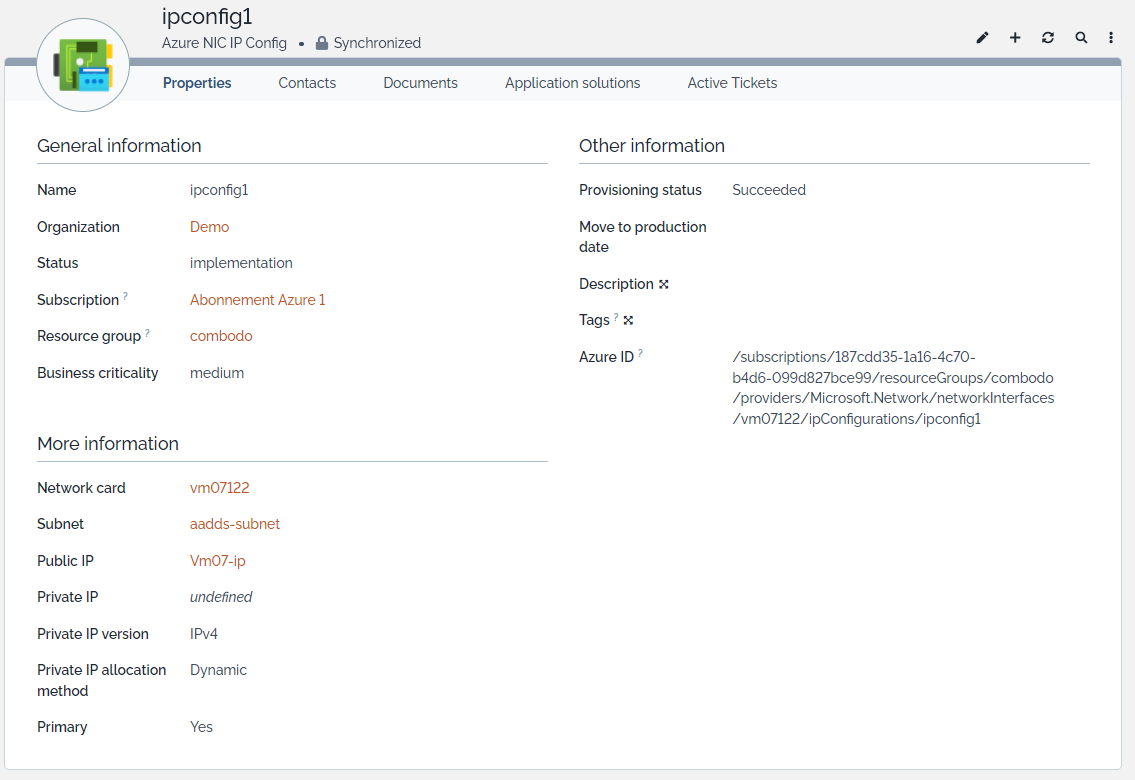 |
| Name |
Alphanumeric string |
Yes |
| Organization |
Foreign key to a(n) Organization |
Yes |
| Status |
Possible values: implementation, inactive,
obsolete, production, stock, stopped |
No |
| Subscription |
Foreign key to a(n) Subscription |
No |
| Resource group |
Foreign key to a(n) Resource group |
No |
| Business criticality |
Possible values: high, medium, low |
No |
| More Information |
| Network card |
Foreign key to a(n) Network Interface |
No |
| Subnet |
Foreign key to a(n) Azure Subnet |
No |
| Public IP |
Foreign key to a(n) Azure Public IP |
No |
| Private IP* |
Alphanumeric string |
No |
| Private IP version |
Possible values: ipv4, ipv6 |
No |
| Private IP allocation method |
Possible values: dynamic, static |
No |
| Primary |
Possible values: yes, no |
No |
| Other
Information |
| Provisioning status |
Possible values: Cancelled, Deleting, Failed, in
progress, Succeeded |
Yes |
| Move to production date |
Date (year-month-day) |
No |
| Description |
HTML string |
No |
| Tags |
Multiline character string |
No |
| Azure ID |
Alphanumeric string |
No |
Tabs
| Tab |
Description |
| Contacts |
All the contacts linked to the Network Interface
Card IP Config |
| Documents |
All the documentation related to the Network
Interface Card IP Config |
| Application solutions |
Application solutions related to the Network
Interface Card IP Config |
| Active Tickets |
Open tickets related to that CI |
In the case where extension TeemIp
- aka IPAM for iTop - is installed, the Private IP attribute
becomes a foreign key toward an IPAddress object.
Azure Load
Balancer
 Azure Load Balancers
evenly distribute load (incoming network traffic) across a group of
back end resources or servers.
Azure Load Balancers
evenly distribute load (incoming network traffic) across a group of
back end resources or servers.
Load Balancer Properties
| Name |
Type |
Mandatory? |
Displaying an Azure Load Balancer |
| General
Information |
 |
| Name |
Alphanumeric string |
Yes |
| Organization |
Foreign key to a(n) Organization |
Yes |
| Status |
Possible values: implementation, inactive,
obsolete, production, stock, stopped |
No |
| Subscription |
Foreign key to a(n) Subscription |
No |
| Resource group |
Foreign key to a(n) Resource group |
No |
| Business criticality |
Possible values: high, medium, low |
No |
| Location |
Foreign key to a(n) Location |
No |
| More Information |
| SKU |
Possible values: Basic, Standard |
No |
| Other
Information |
| Provisioning status |
Possible values: Cancelled, Deleting, Failed, in
progress, Succeeded |
Yes |
| Move to production date |
Date (year-month-day) |
No |
| Description |
HTML string |
No |
| Tags |
Multiline character string |
No |
| Azure ID |
Alphanumeric string |
No |
Tabs
| Tab |
Description |
| IPs Overview* |
Dashboard displaying the IPs related to the load
balancer |
| Contacts |
All the contacts linked to the load balancer |
| Documents |
All the documentation related to the load
balancer |
| Application solutions |
Application solutions related to the load
balancer |
| Frontend IP Configs |
All Frontend IP Configs that belong to the load
balancer |
| Active Tickets |
Open tickets related to that CI |
IPs Overview tab is only available
when TeemIp (aka IPAM for iTop) is installed.
Load Balancer Frontend IP Config
 Load Balancer Frontend
IP Configs host the IP configuration that can be assigned to a load
balancer.
Load Balancer Frontend
IP Configs host the IP configuration that can be assigned to a load
balancer.
Load Balancer
Frontend IP Config Properties
| Name |
Type |
Mandatory? |
Displaying an Azure Load Balancer
Frontend IP Config |
| General
Information |
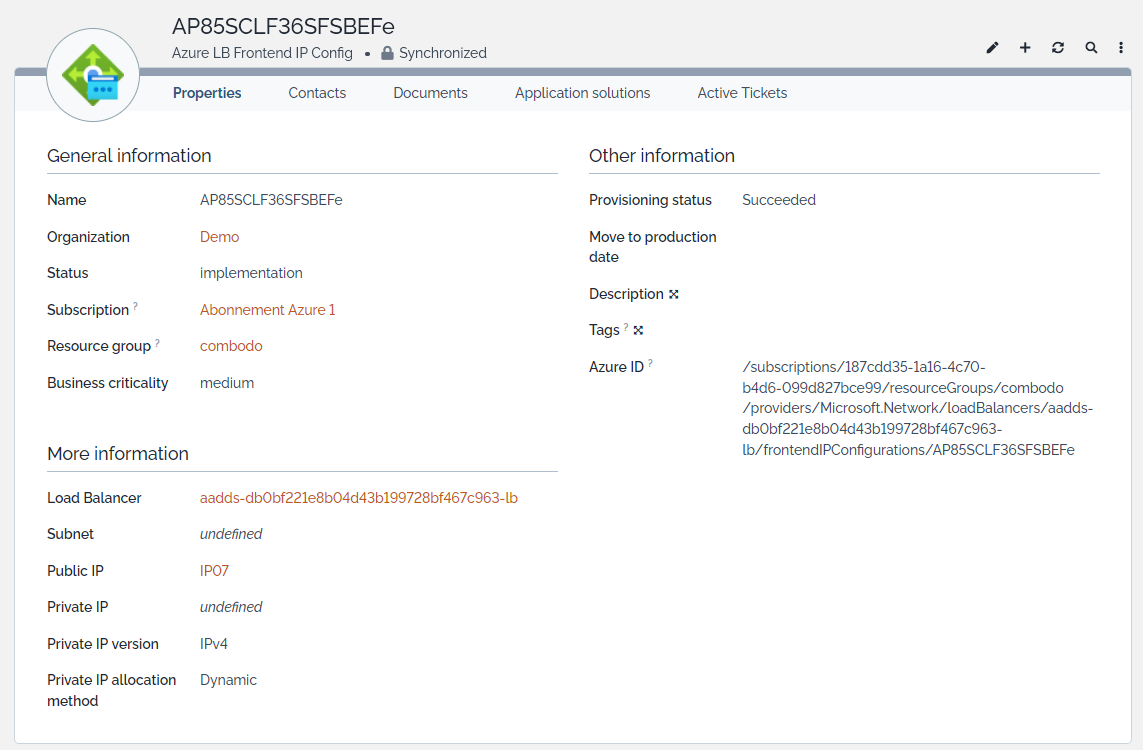 |
| Name |
Alphanumeric string |
Yes |
| Organization |
Foreign key to a(n) Organization |
Yes |
| Status |
Possible values: implementation, inactive,
obsolete, production, stock, stopped |
No |
| Subscription |
Foreign key to a(n) Subscription |
No |
| Resource group |
Foreign key to a(n) Resource group |
No |
| Business criticality |
Possible values: high, medium, low |
No |
| More Information |
| Load Balancer |
Foreign key to a(n) Load Balancer |
No |
| Subnet |
Foreign key to a(n) Azure Subnet |
No |
| Public IP |
Foreign key to a(n) Azure Public IP |
No |
| Private IP* |
Alphanumeric string |
No |
| Private IP version |
Possible values: ipv4, ipv6 |
No |
| Private IP allocation method |
Possible values: dynamic, static |
No |
| Other
Information |
| Provisioning status |
Possible values: Cancelled, Deleting, Failed, in
progress, Succeeded |
Yes |
| Move to production date |
Date (year-month-day) |
No |
| Description |
HTML string |
No |
| Tags |
Multiline character string |
No |
| Azure ID |
Alphanumeric string |
No |
Tabs
| Tab |
Description |
| Contacts |
All the contacts linked to the Load Balancer
Frontend IP Config |
| Documents |
All the documentation related to the Load Balancer
Frontend IP Config |
| Application solutions |
Application solutions related to the Load Balancer
Frontend IP Config |
| Active Tickets |
Open tickets related to that CI |
In the case where extension TeemIp
- aka IPAM for iTop - is installed, the Private IP attribute
becomes a foreign key toward an IPAddress object.
VNet Gateway

The virtual network data gateway helps you to connect from
Microsoft Cloud services to your Azure data services within a VNet
without the need of an on-premises data gateway. The VNet gateway
securely communicates with the data source, executes queries, and
transmits results back to the service.
VNet Gateway Properties
| Name |
Type |
Mandatory? |
Displaying an Azure VNet Gateway |
| General
Information |
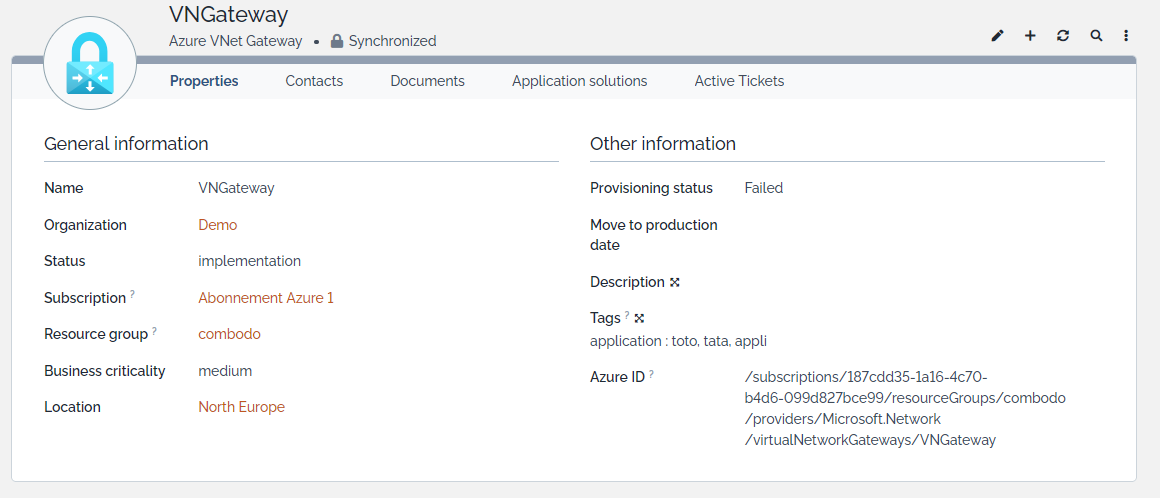 |
| Name |
Alphanumeric string |
Yes |
| Organization |
Foreign key to a(n) Organization |
Yes |
| Status |
Possible values: implementation, inactive,
obsolete, production, stock, stopped |
No |
| Subscription |
Foreign key to a(n) Subscription |
No |
| Resource group |
Foreign key to a(n) Resource group |
No |
| Business criticality |
Possible values: high, medium, low |
No |
| Location |
Foreign key to a(n) Location |
No |
| Other
Information |
| Provisioning status |
Possible values: Cancelled, Deleting, Failed, in
progress, Succeeded |
Yes |
| Move to production date |
Date (year-month-day) |
No |
| Description |
HTML string |
No |
| Tags |
Multiline character string |
No |
| Azure ID |
Alphanumeric string |
No |
Tabs
| Tab |
Description |
| Contacts |
All the contacts linked to the VNet gateway |
| Documents |
All the documentation related to the VNet
gateway |
| Application solutions |
Application solutions related to the VNet
gateway |
| Active Tickets |
Open tickets related to that CI |
Public IP
Address
 Public IP addresses
allow Internet resources to communicate inbound to Azure resources.
Public IP addresses enable Azure resources to communicate to
Internet and public-facing Azure services.
Public IP addresses
allow Internet resources to communicate inbound to Azure resources.
Public IP addresses enable Azure resources to communicate to
Internet and public-facing Azure services.
Public IP Address
Properties
| Name |
Type |
Mandatory? |
Displaying an Azure Public IP
Address |
| General
Information |
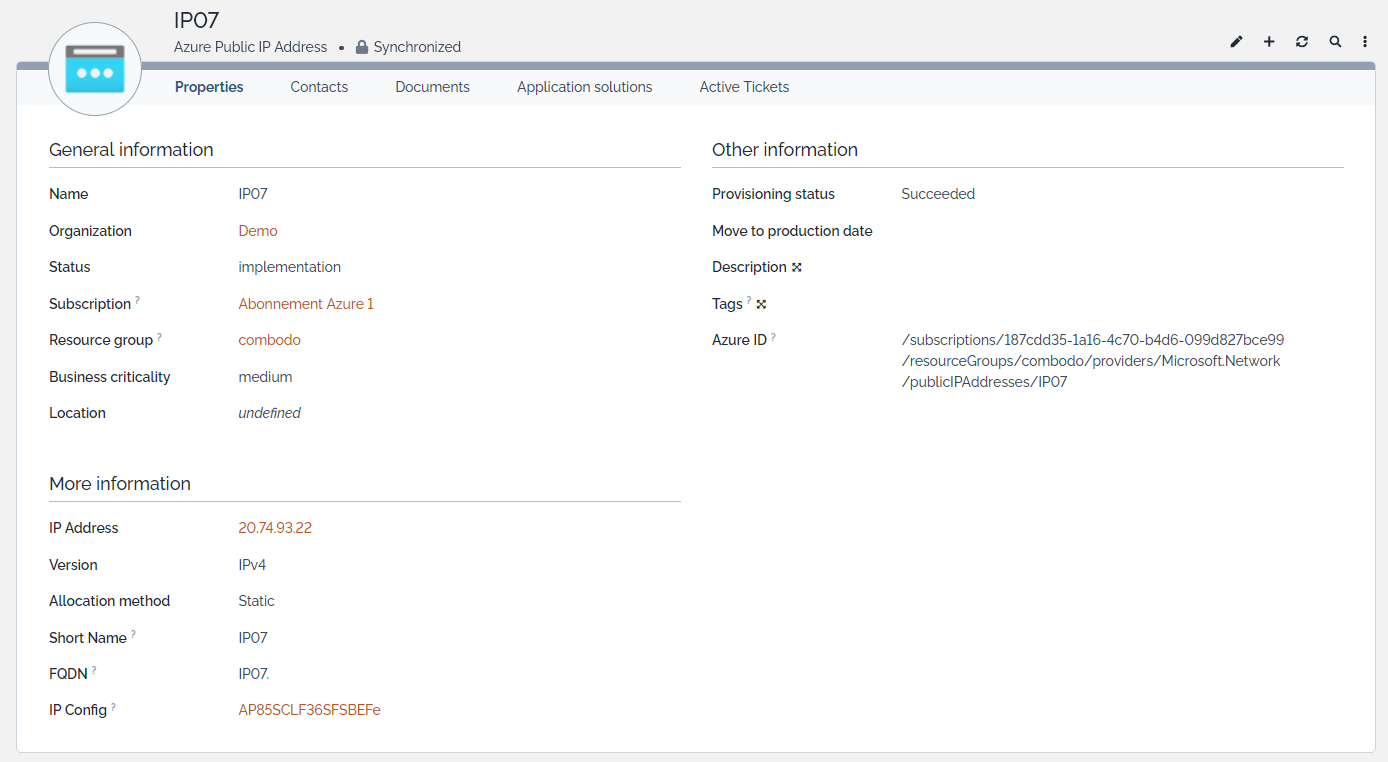 |
| Name |
Alphanumeric string |
Yes |
| Organization |
Foreign key to a(n) Organization |
Yes |
| Status |
Possible values: implementation, inactive,
obsolete, production, stock, stopped |
No |
| Subscription |
Foreign key to a(n) Subscription |
No |
| Resource group |
Foreign key to a(n) Resource group |
No |
| Business criticality |
Possible values: high, medium, low |
No |
| Location |
Foreign key to a(n) Location |
No |
| More Information |
| IP Address* |
Alphanumeric string |
No |
| Version |
Possible values: IPv4,IPv6 |
No |
| Allocation method |
Possible values: Static, Dynamic |
No |
| Short name |
Alphanumeric string |
No |
| FQDN |
Alphanumeric string |
No |
| IP Config |
Foreign key to a(n) Network Interface IP Config or
a Load Balancer Frontend IP Config |
No |
| Other
Information |
| Provisioning status |
Possible values: Cancelled, Deleting, Failed, in
progress, Succeeded |
Yes |
| Move to production date |
Date (year-month-day) |
No |
| Description |
HTML string |
No |
| Tags |
Multiline character string |
No |
| Azure ID |
Alphanumeric string |
No |
Tabs
| Tab |
Description |
| Contacts |
All the contacts linked to the IP Address |
| Documents |
All the documentation related to the IP
Address |
| Application solutions |
Application solutions related to the IP
Address |
| Active Tickets |
Open tickets related to that CI |
In the case where extension TeemIp
- aka IPAM for iTop - is installed, the IP Address attribute
becomes a foreign key toward an IPAddress object.
Subnet
 An Azure subnet (known
as a public IP address prefix) is a reserved range of public IP
addresses in Azure. Subnets are assigned from a pool of addresses
in each Azure region.
An Azure subnet (known
as a public IP address prefix) is a reserved range of public IP
addresses in Azure. Subnets are assigned from a pool of addresses
in each Azure region.
Subnet Properties
| Name |
Type |
Mandatory? |
Displaying an Azure Subnet |
| General
Information |
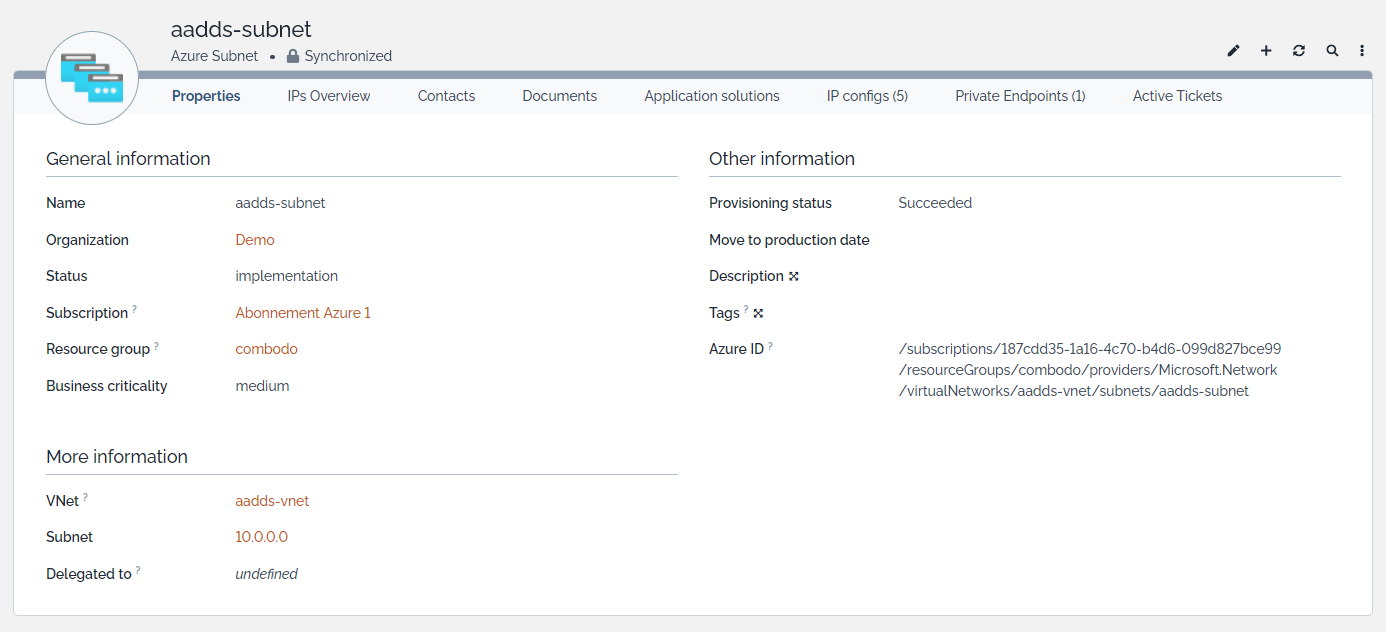 |
| Name |
Alphanumeric string |
Yes |
| Organization |
Foreign key to a(n) Organization |
Yes |
| Status |
Possible values: implementation, inactive,
obsolete, production, stock, stopped |
No |
| Subscription |
Foreign key to a(n) Subscription |
No |
| Resource group |
Foreign key to a(n) Resource group |
No |
| Business criticality |
Possible values: high, medium, low |
No |
| Location |
Foreign key to a(n) Location |
No |
| More Information |
| VNet |
Foreign key to a(n) VNet |
No |
| Subnet* |
Alphanumeric string |
No |
| Delegated to |
Foreign key to a(n) Azure CI |
No |
| Other
Information |
| Provisioning status |
Possible values: Cancelled, Deleting, Failed, in
progress, Succeeded |
Yes |
| Move to production date |
Date (year-month-day) |
No |
| Description |
HTML string |
No |
| Tags |
Multiline character string |
No |
| Azure ID |
Alphanumeric string |
No |
Tabs
| Tab |
Description |
| IPs Overview* |
Dashboard displaying the IPs related to the
subnet |
| Contacts |
All the contacts linked to the subnet |
| Documents |
All the documentation related to the subnet |
| Application solutions |
Application solutions related to the subnet |
| IP Configs |
All the Network Interface IP Configs related to
the subnet |
| Private Endpoints |
All the Private Endpoints related to the
subnet |
| Active Tickets |
Open tickets related to that CI |
In the case where extension TeemIp
- aka IPAM for iTop - is installed, the subnet attribute becomes a
foreign key toward an IPSubnet object. The IPs Overview tab is only
available in that case.
TeemIp / IPAM
for iTop
Combodo Azure Datamodel extension accommodates iTop with TeemIp
extension (aka IPAM for iTop) installed or not.
Without TeemIp
When TeemIp is not installed, all IP addresses
or subnets attributes of Azure datamodel are just simple strings in
IPv4 or IPv6 format.
With TeemIp
When TeemIp is installed, all IP Addresses or
subnets attributes become external keys toward IP Addresses or IP
Subnets. Furthermore IP address or subnets set in Azure are
transformed, through dedicated data synchro, into IP Addresses
(IPv4 or IPv6) or IP Subnets (IPv4 or IPv6).
In such configuration, Azure Datamodel automatically alters IP
Addresses and IP Subnets.
-
IP Addresses have a new hidden attribute
(“azureip”) that defines if a given IP has been created from Azure
data collector or not.
-
Their “CIs” tab will automatically display the list
of Azure CIs pointing to them.
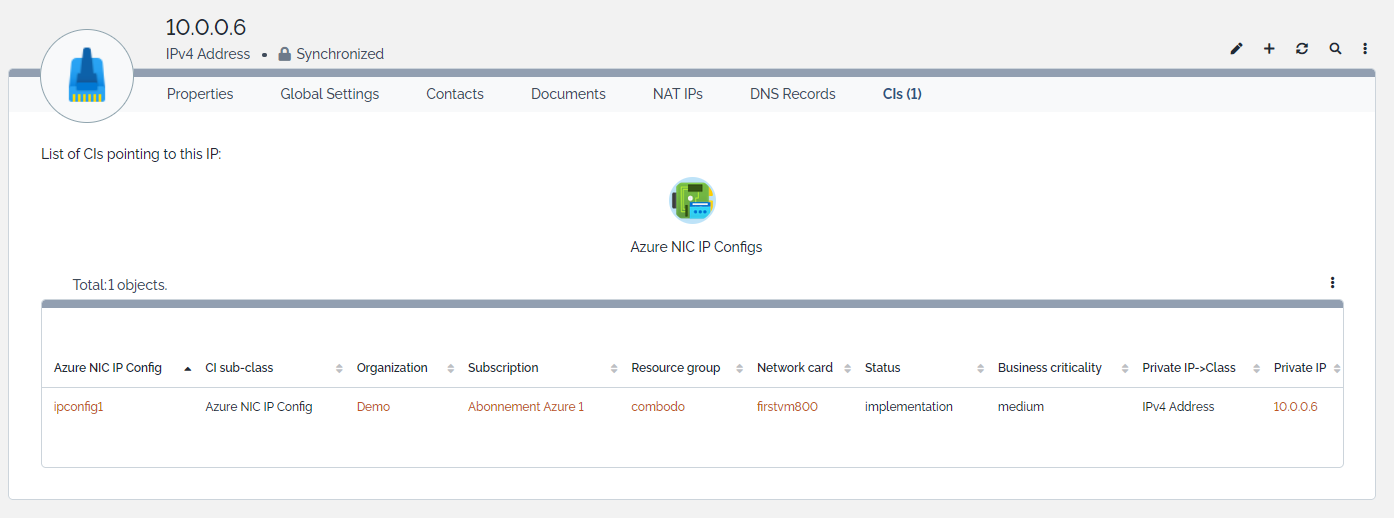
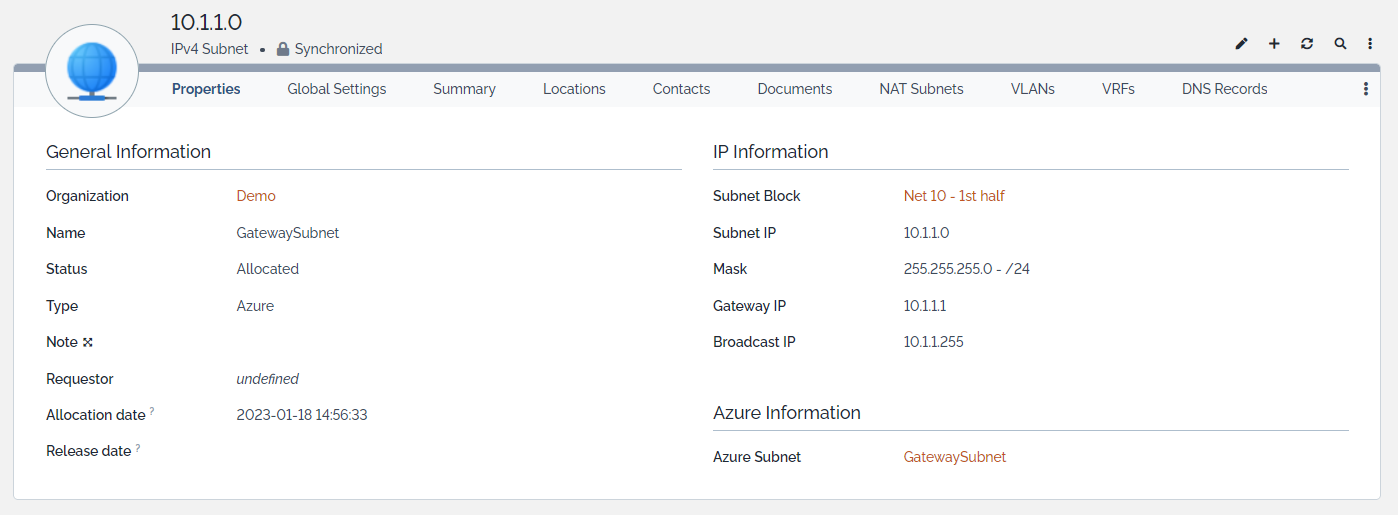
![]() Locations defined in Azure
are mapped to standard iTop location objects. For that purpose, the
attribute “code” is added to the standard datamodel.
Locations defined in Azure
are mapped to standard iTop location objects. For that purpose, the
attribute “code” is added to the standard datamodel.![]() Azure Subscriptions
are logical units of Azure services that are linked to an Azure
account. They've been defined in iTop as a daughter class of the
Contract class.
Azure Subscriptions
are logical units of Azure services that are linked to an Azure
account. They've been defined in iTop as a daughter class of the
Contract class.![]() Azure Resource Groups
are nothing but logical containers where Azure resources can be
created and maintained.
Azure Resource Groups
are nothing but logical containers where Azure resources can be
created and maintained.![]() An Azure Virtual Machine
(VM) is one of several types of on-demand, scalable computing
resources that Azure offers.
An Azure Virtual Machine
(VM) is one of several types of on-demand, scalable computing
resources that Azure offers.![]() Azure managed disks
are block-level storage volumes that are managed by Azure and used
with Azure Virtual Machines.
Azure managed disks
are block-level storage volumes that are managed by Azure and used
with Azure Virtual Machines.![]() An Azure storage
account provides a unique namespace for your Azure Storage data. It
contains all of your Azure Storage data objects, including blobs,
file shares, queues, tables, and disks.
An Azure storage
account provides a unique namespace for your Azure Storage data. It
contains all of your Azure Storage data objects, including blobs,
file shares, queues, tables, and disks.![]() Azure Kubernetes
Service is a managed container orchestration service based on the
open source Kubernetes system, which is available on the Microsoft
Azure public cloud.
Azure Kubernetes
Service is a managed container orchestration service based on the
open source Kubernetes system, which is available on the Microsoft
Azure public cloud.![]() An Azure App Service
is an HTTP-based service for hosting web applications, REST APIs,
and mobile back ends.
An Azure App Service
is an HTTP-based service for hosting web applications, REST APIs,
and mobile back ends.![]() A private endpoint is
a network interface that uses a private IP address from your
virtual network. This network interface connects you privately and
securely to a service that's powered by Azure Private Link. By
enabling a private endpoint, you're bringing the service into your
virtual network.
A private endpoint is
a network interface that uses a private IP address from your
virtual network. This network interface connects you privately and
securely to a service that's powered by Azure Private Link. By
enabling a private endpoint, you're bringing the service into your
virtual network.![]() Azure Virtual Network
(VNet) is the fundamental building block for your private network
in Azure. It enables many types of Azure resources, such as Azure
VMs, to securely communicate with each other, the internet, and
on-premises networks.
Azure Virtual Network
(VNet) is the fundamental building block for your private network
in Azure. It enables many types of Azure resources, such as Azure
VMs, to securely communicate with each other, the internet, and
on-premises networks.![]() A Network Interface
Card (NIC) is an interconnection between a Virtual Machine and the
underlying software network.
A Network Interface
Card (NIC) is an interconnection between a Virtual Machine and the
underlying software network.![]() Network Interface Card
IP Config host the IP configuration that can be assigned to a
virtual machine's network interface card.
Network Interface Card
IP Config host the IP configuration that can be assigned to a
virtual machine's network interface card.![]() Azure Load Balancers
evenly distribute load (incoming network traffic) across a group of
back end resources or servers.
Azure Load Balancers
evenly distribute load (incoming network traffic) across a group of
back end resources or servers.![]() Load Balancer Frontend
IP Configs host the IP configuration that can be assigned to a load
balancer.
Load Balancer Frontend
IP Configs host the IP configuration that can be assigned to a load
balancer.![]() Public IP addresses
allow Internet resources to communicate inbound to Azure resources.
Public IP addresses enable Azure resources to communicate to
Internet and public-facing Azure services.
Public IP addresses
allow Internet resources to communicate inbound to Azure resources.
Public IP addresses enable Azure resources to communicate to
Internet and public-facing Azure services.![]() An Azure subnet (known
as a public IP address prefix) is a reserved range of public IP
addresses in Azure. Subnets are assigned from a pool of addresses
in each Azure region.
An Azure subnet (known
as a public IP address prefix) is a reserved range of public IP
addresses in Azure. Subnets are assigned from a pool of addresses
in each Azure region.




























